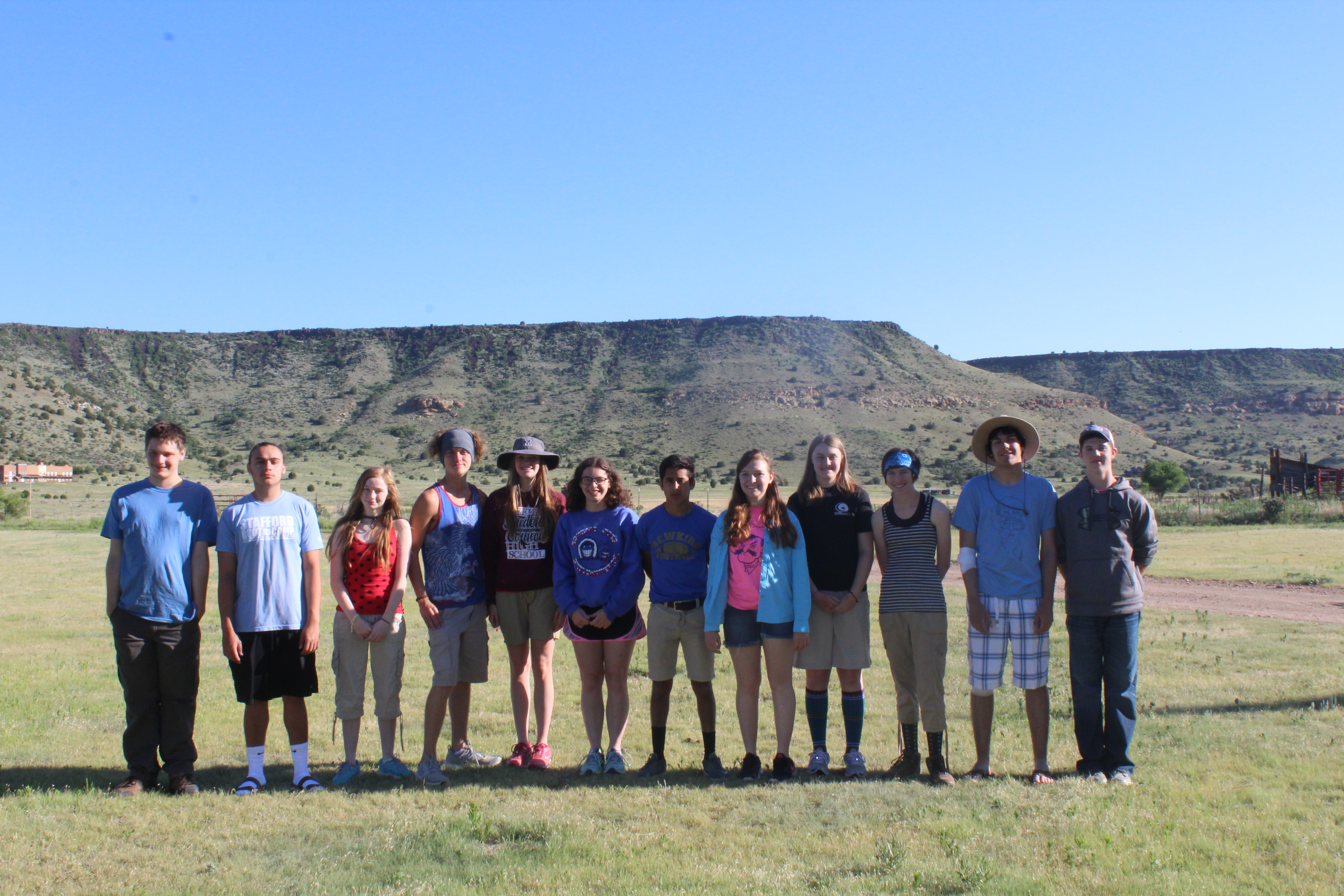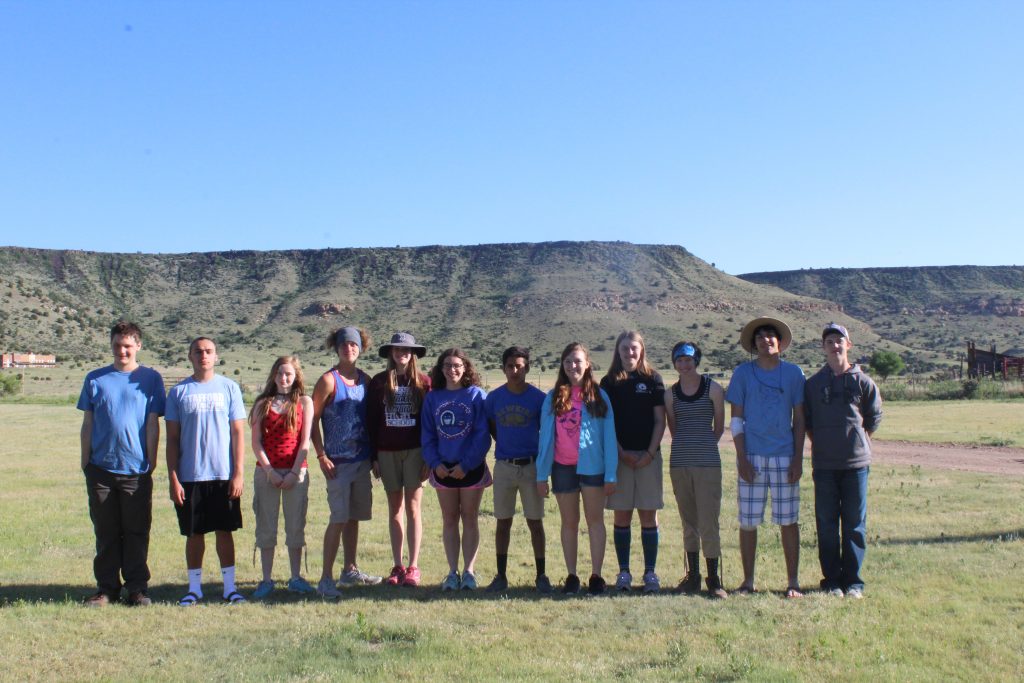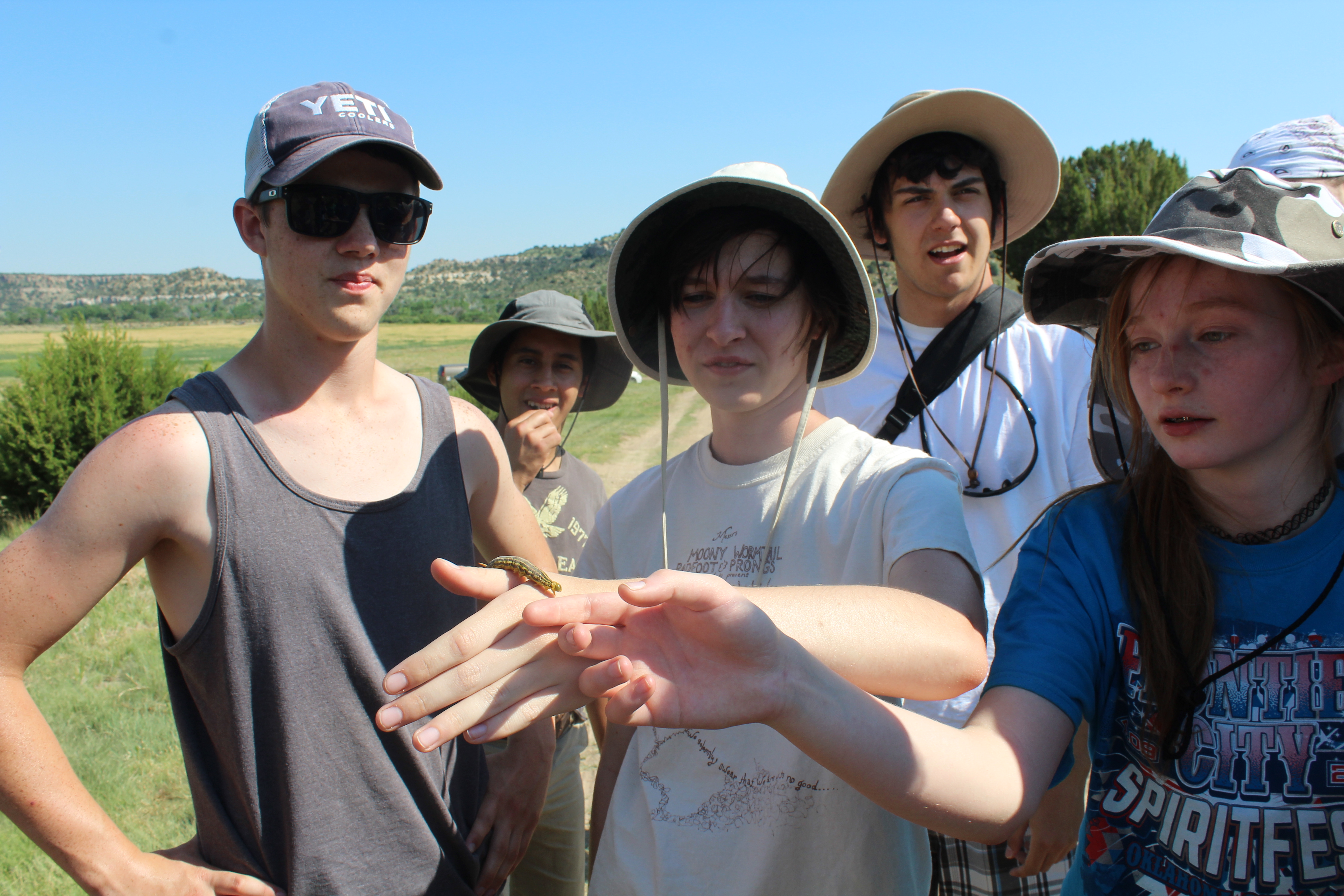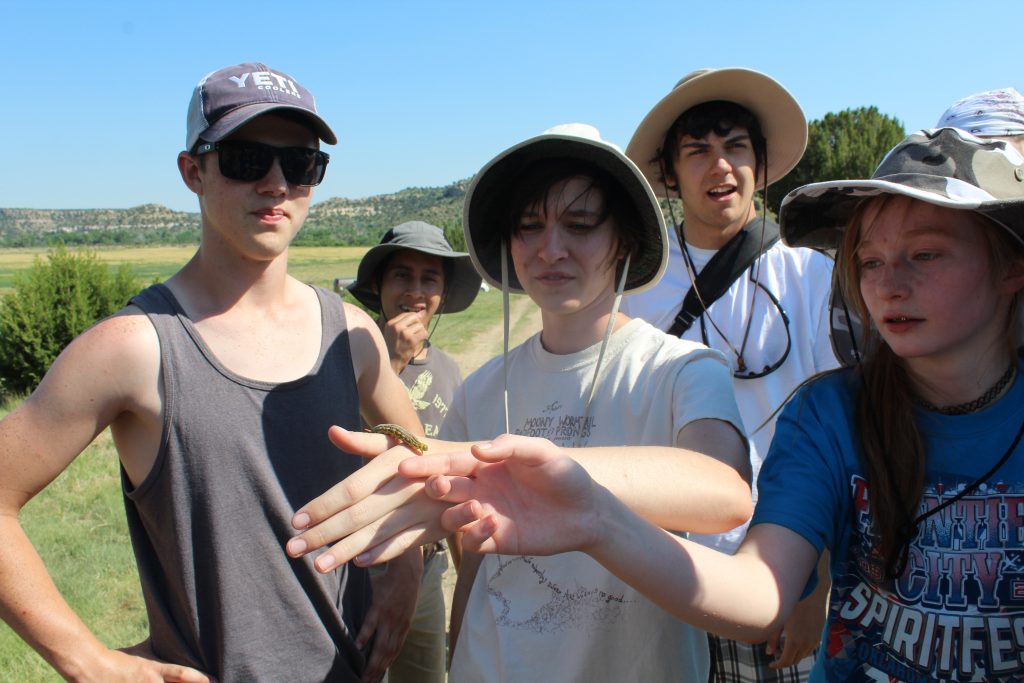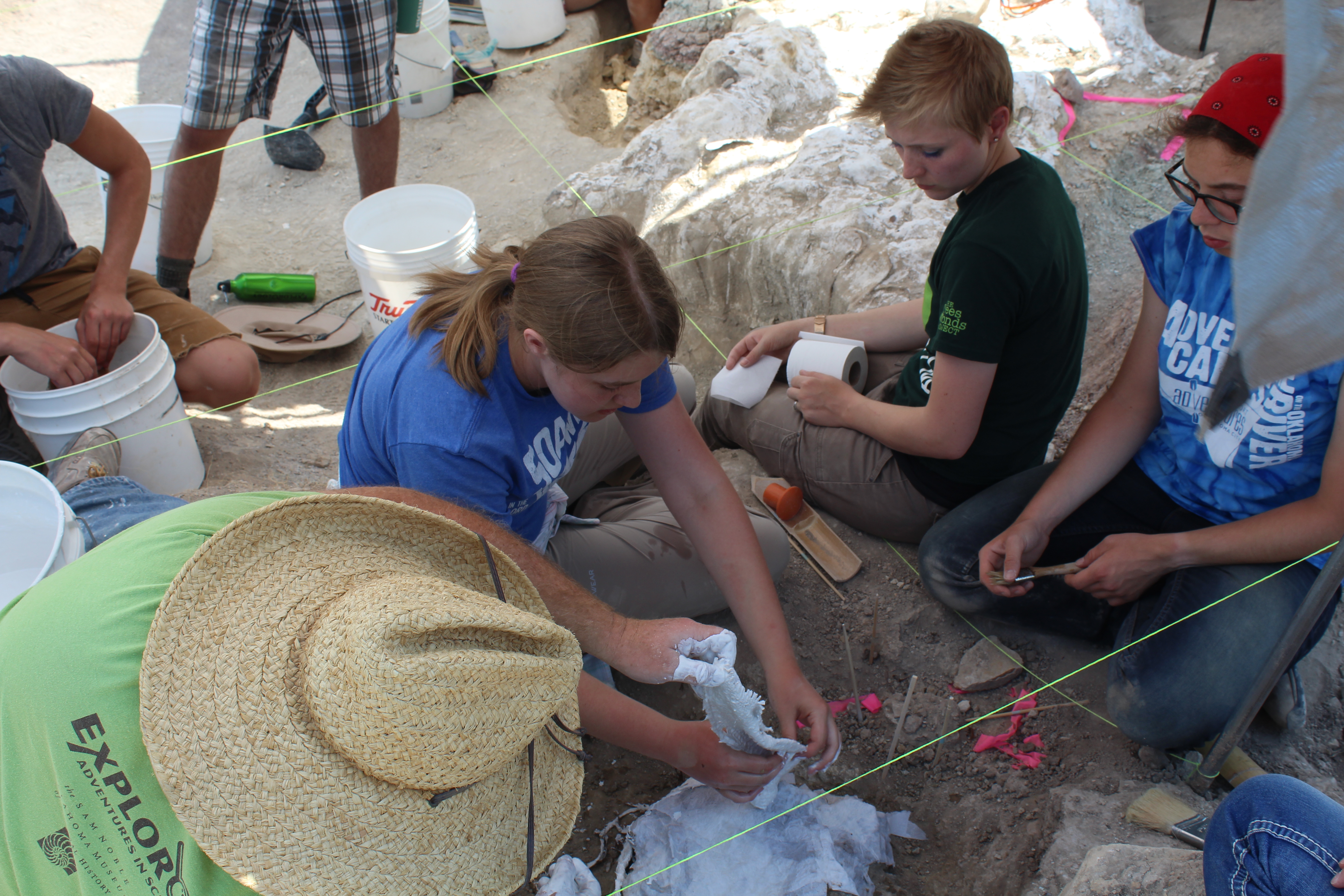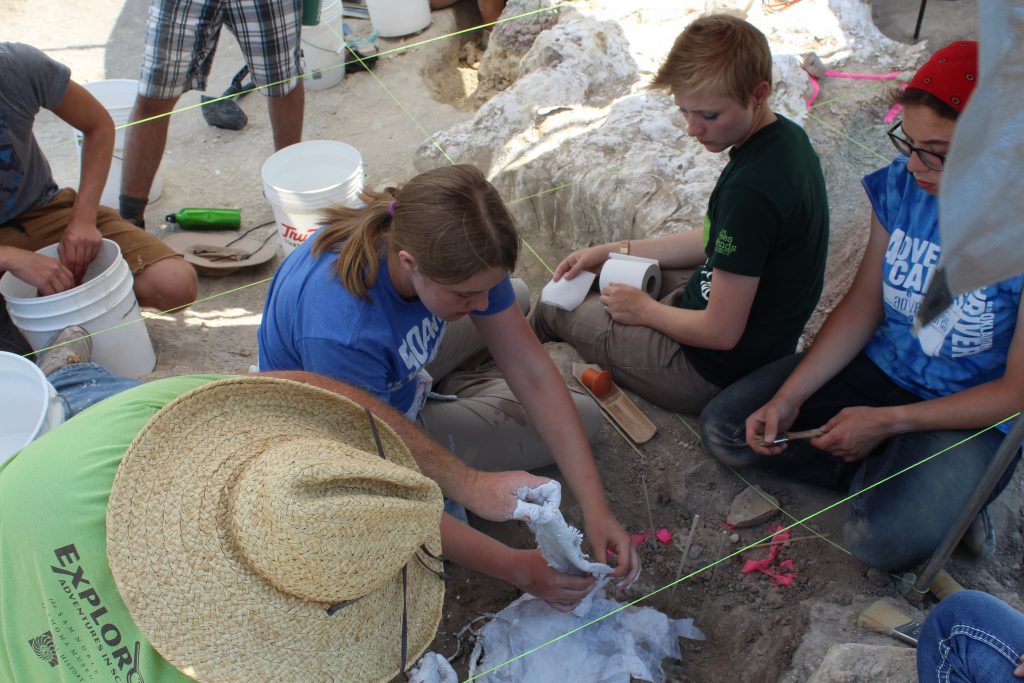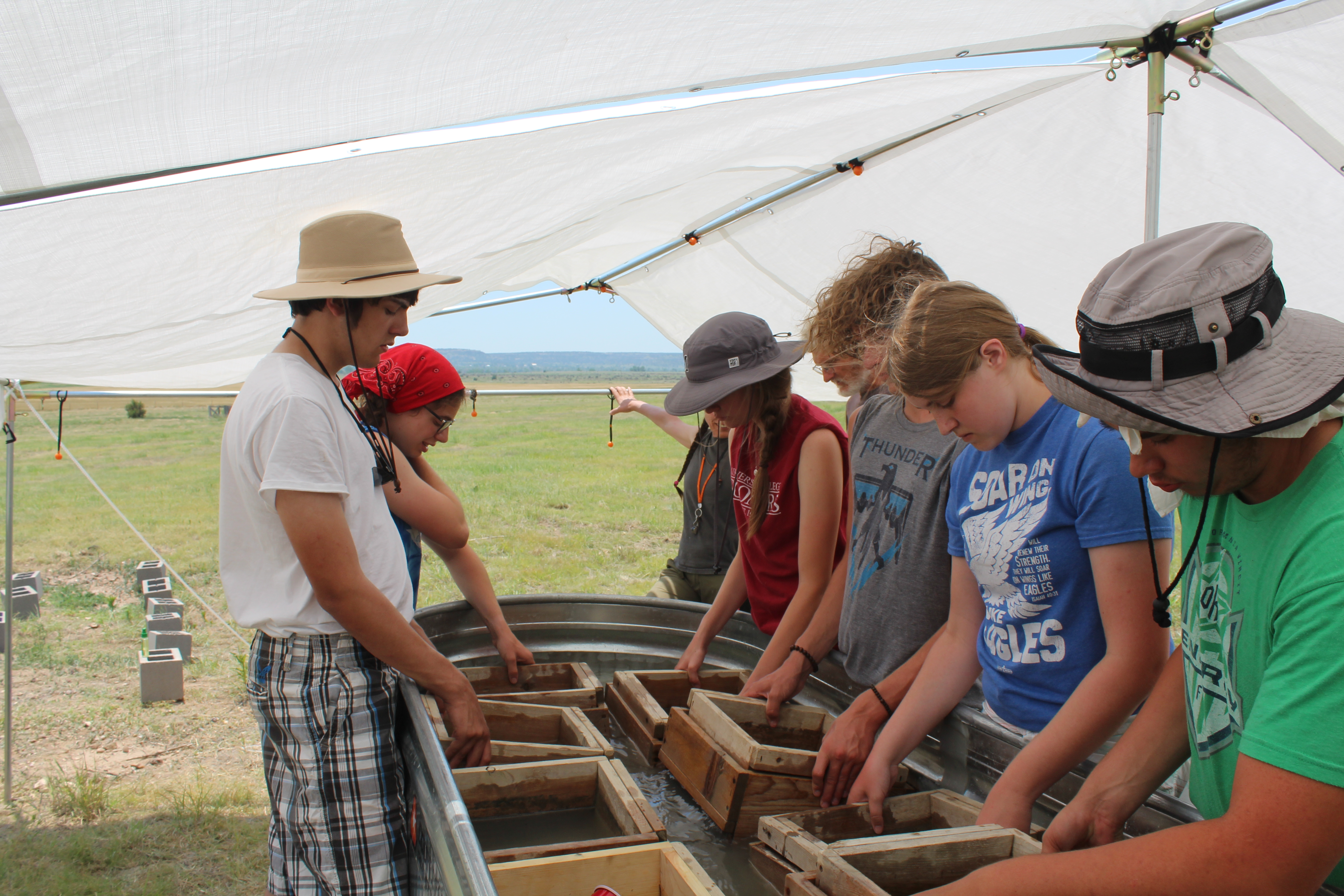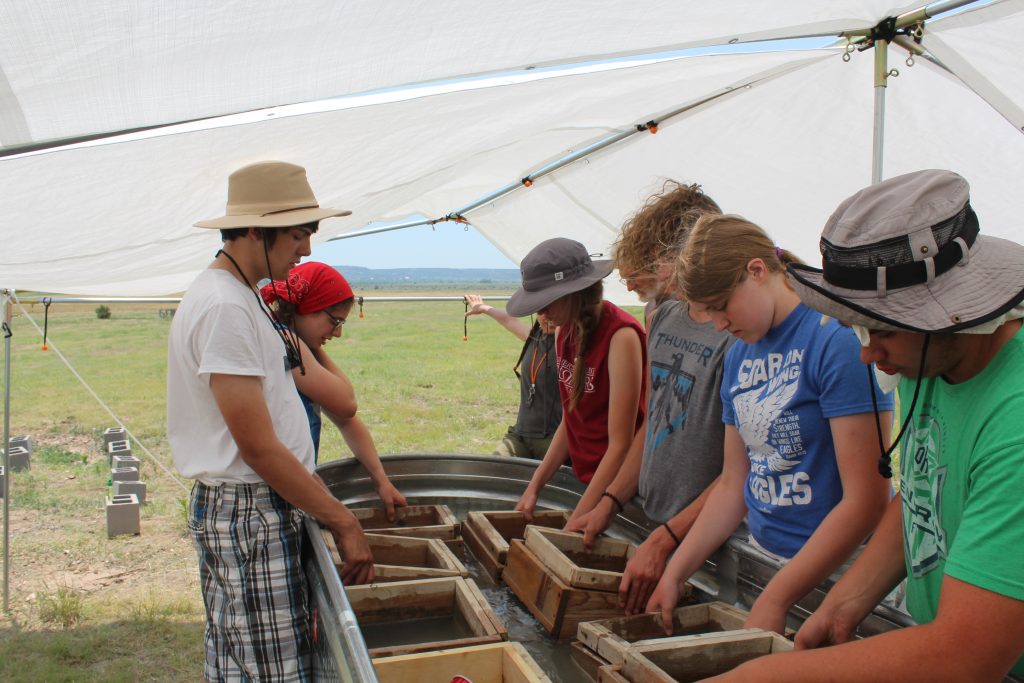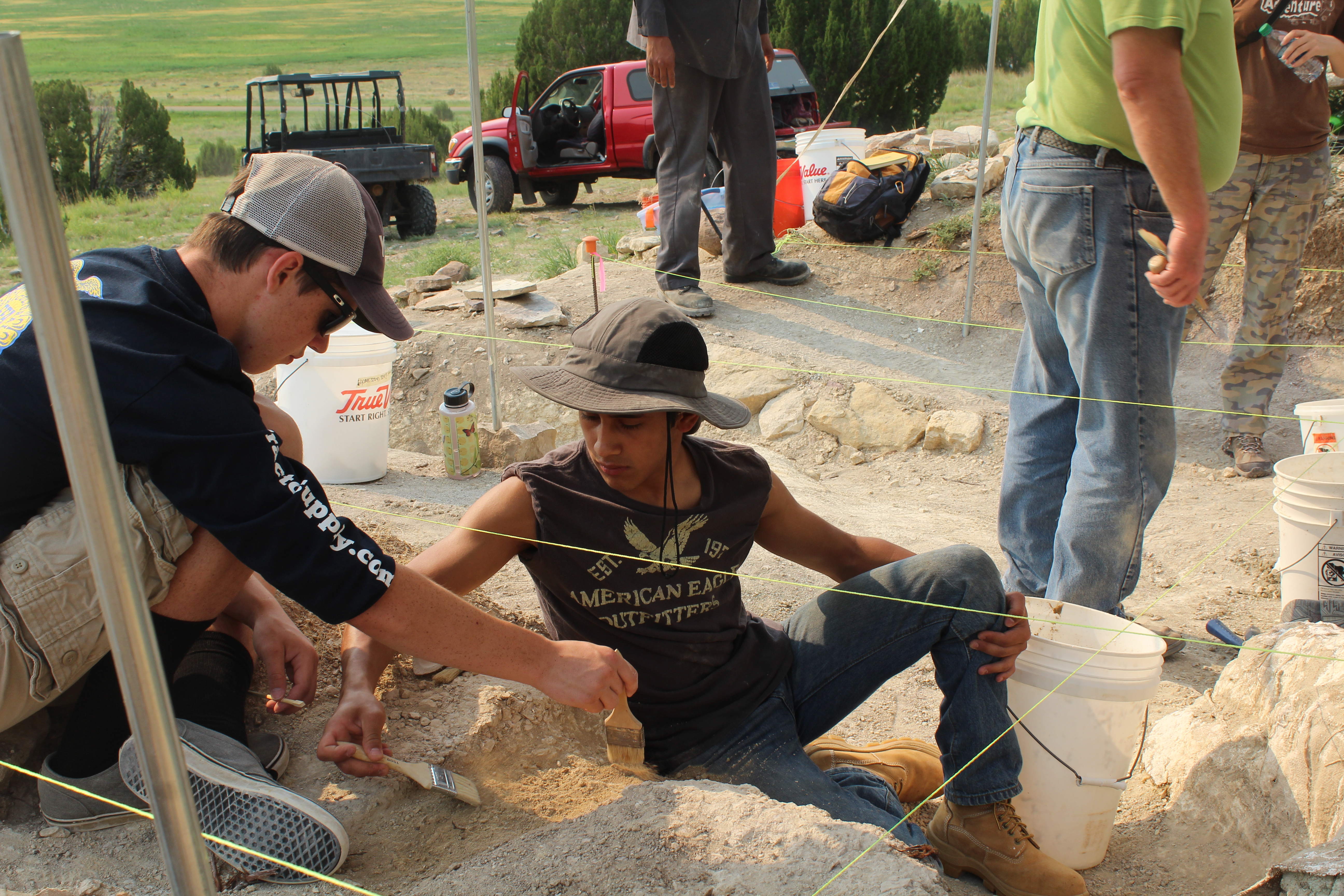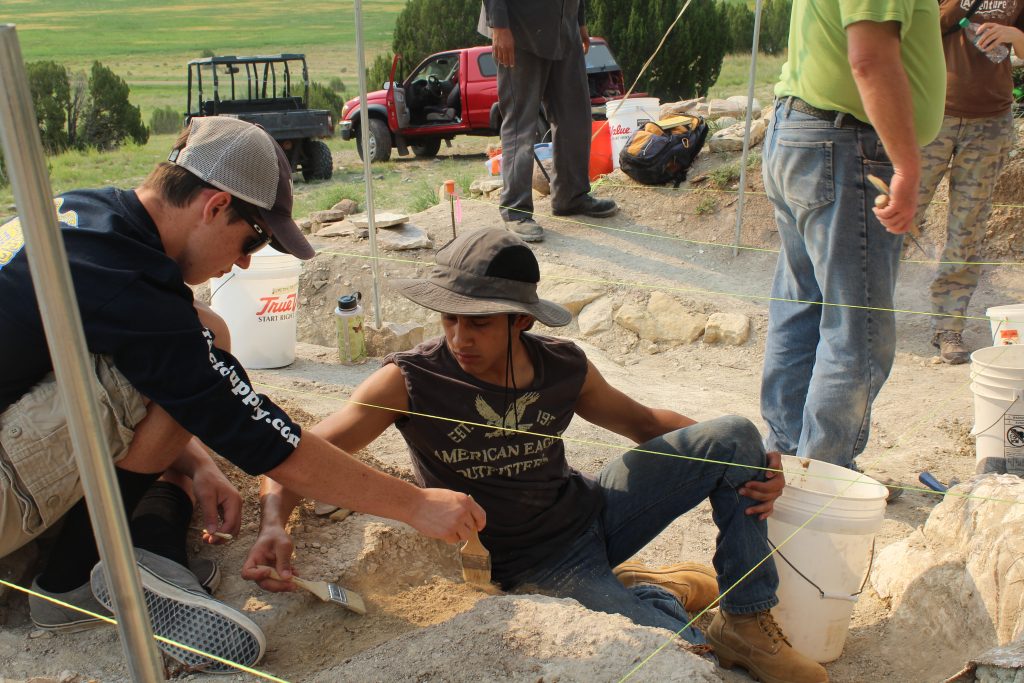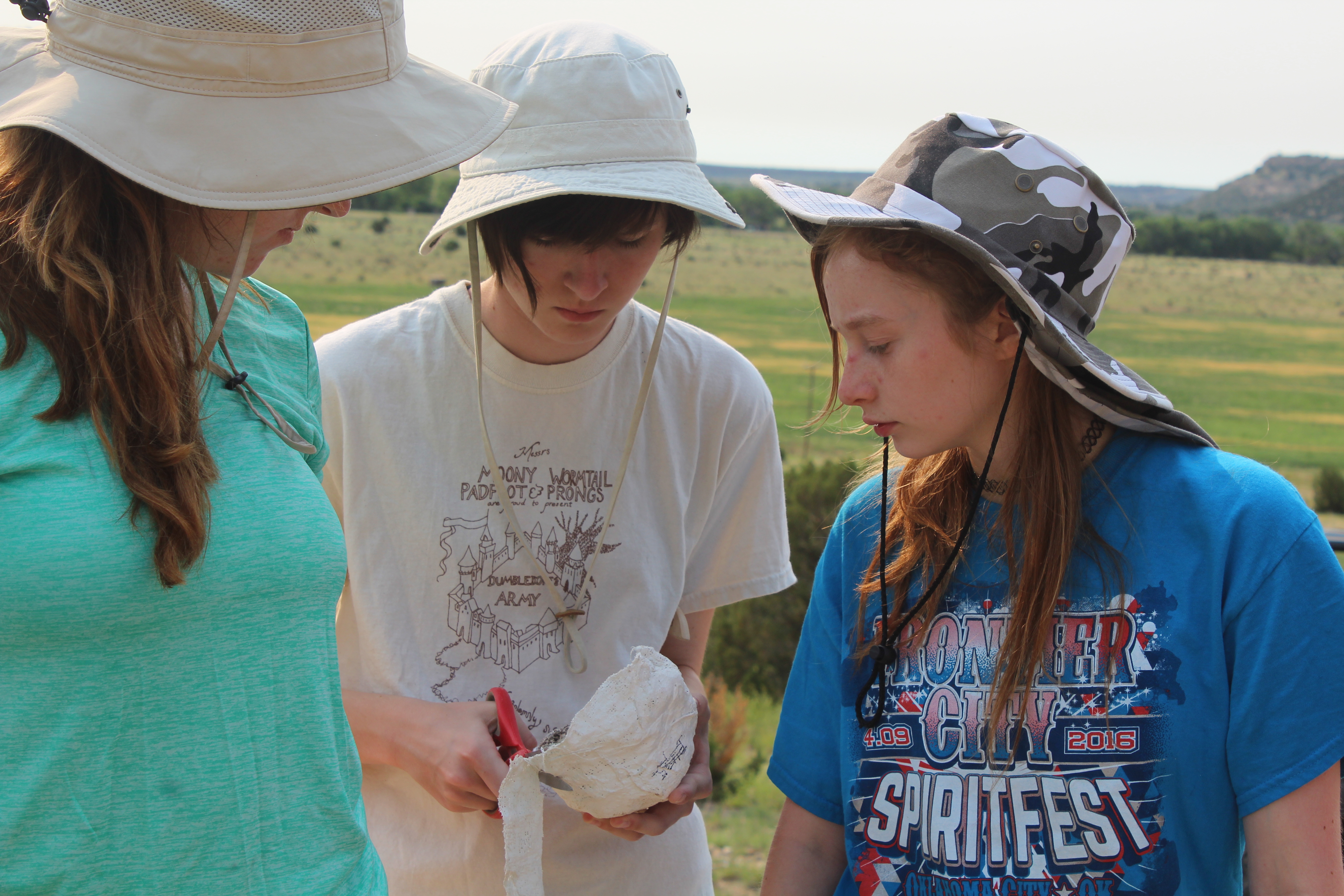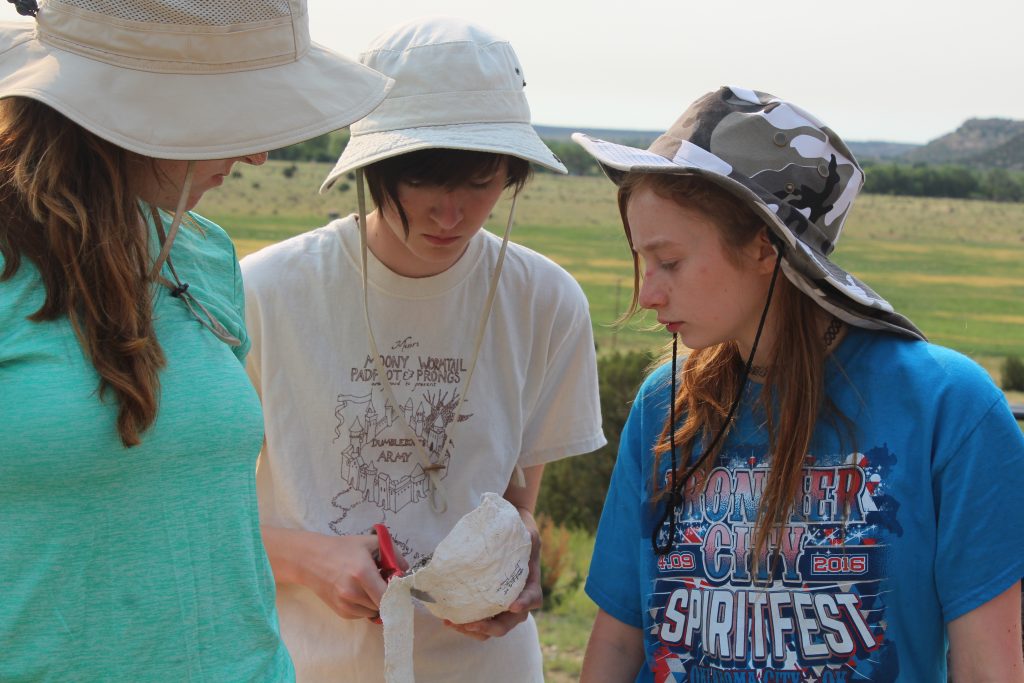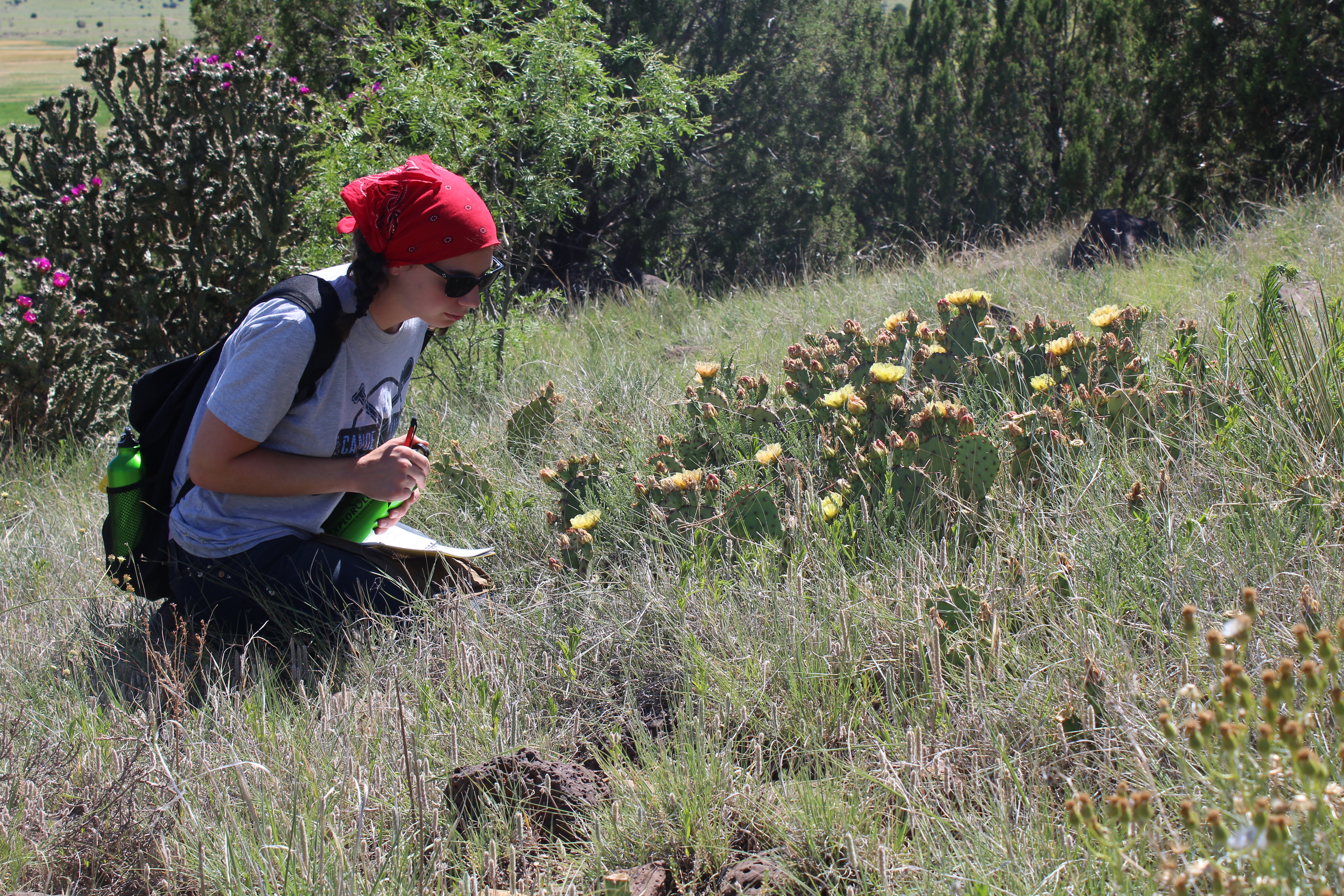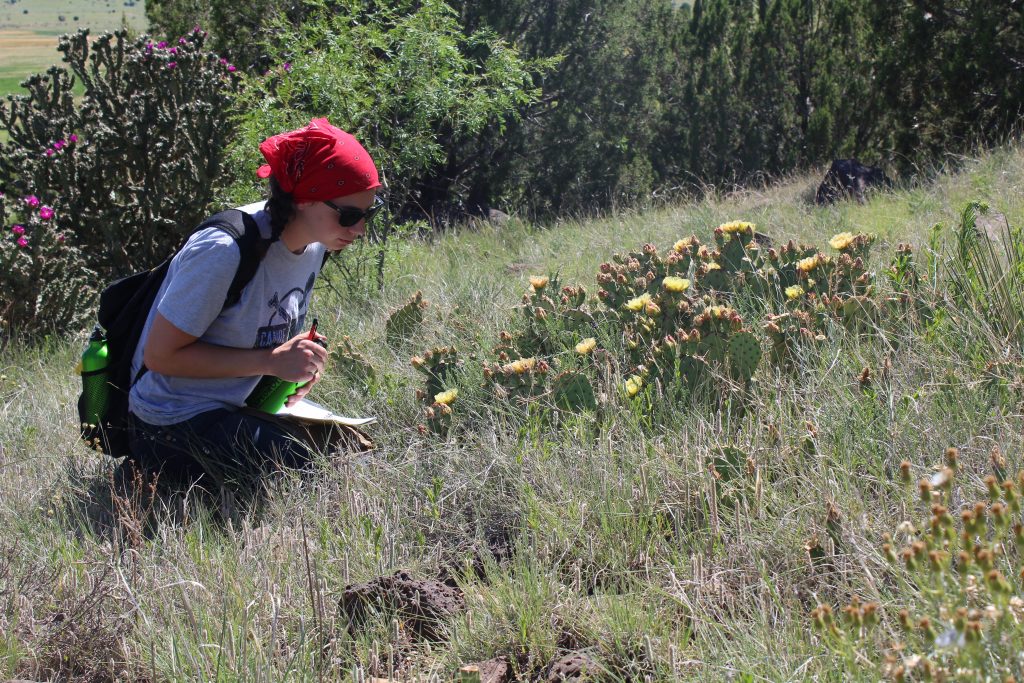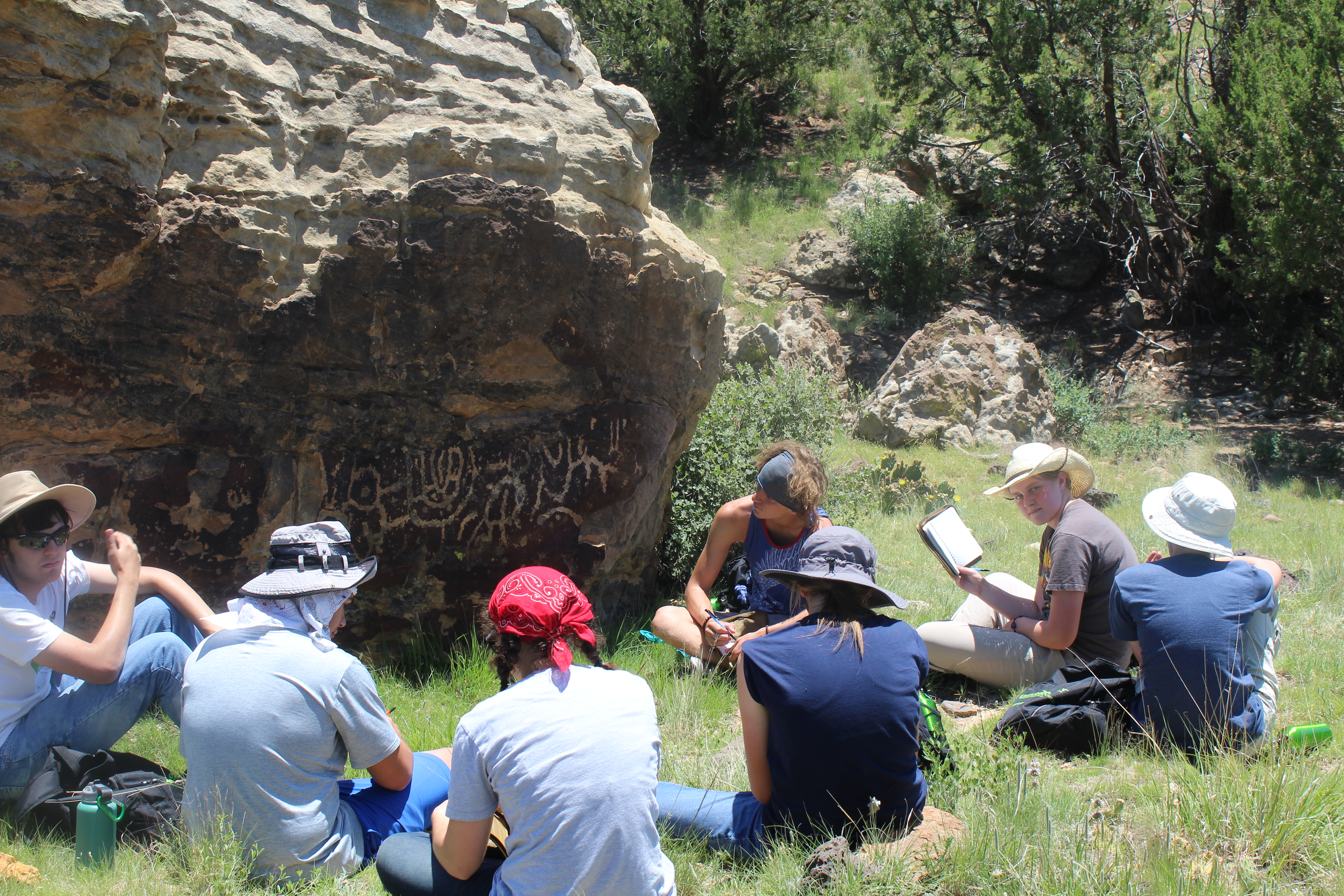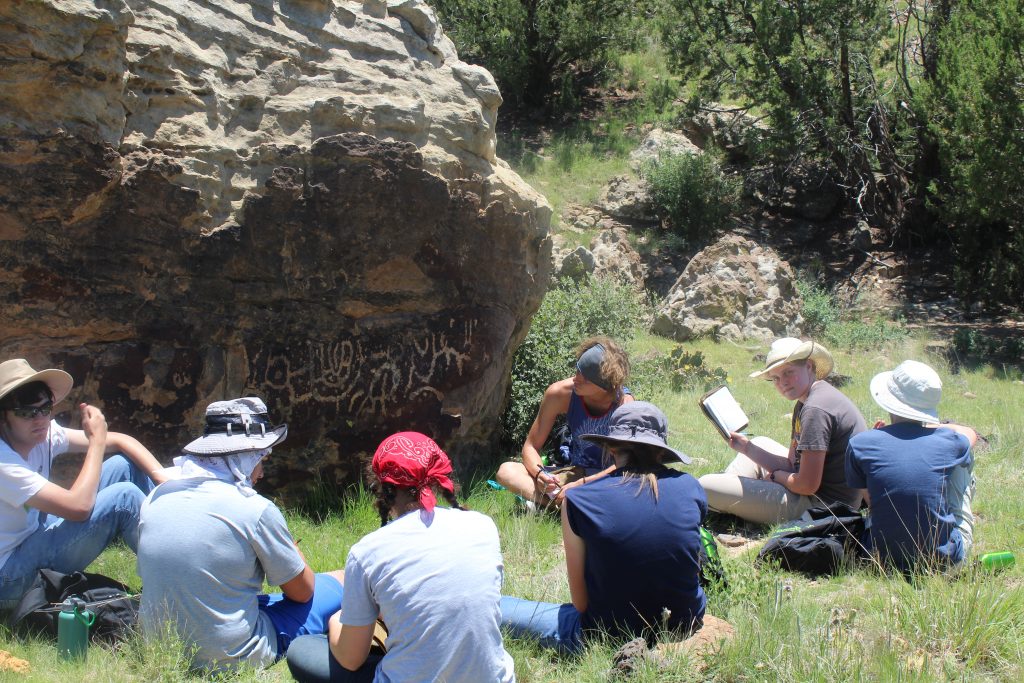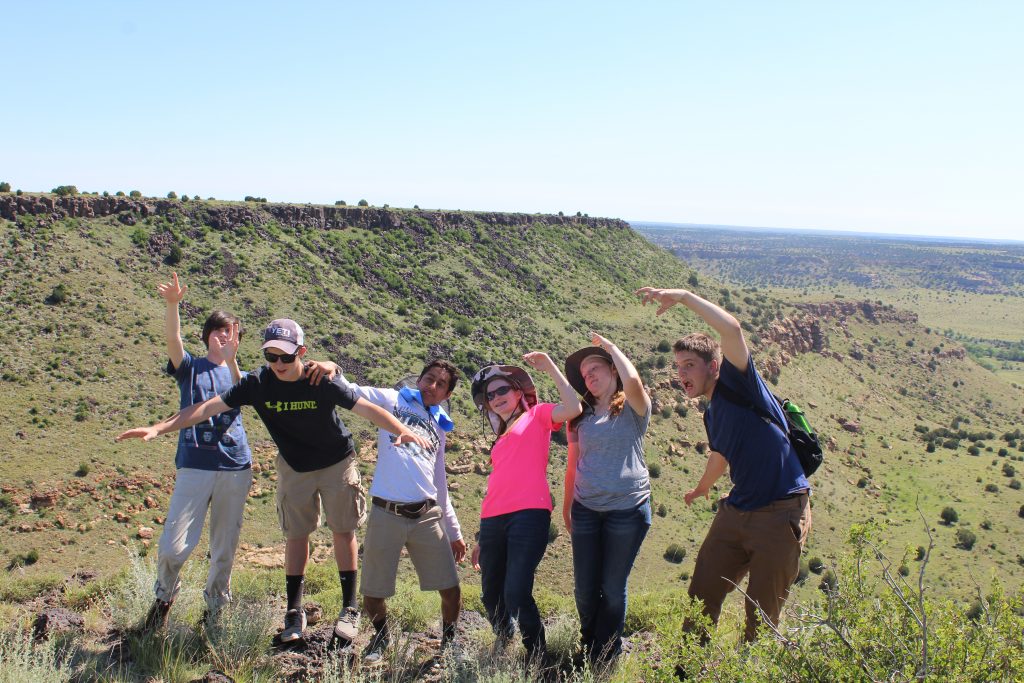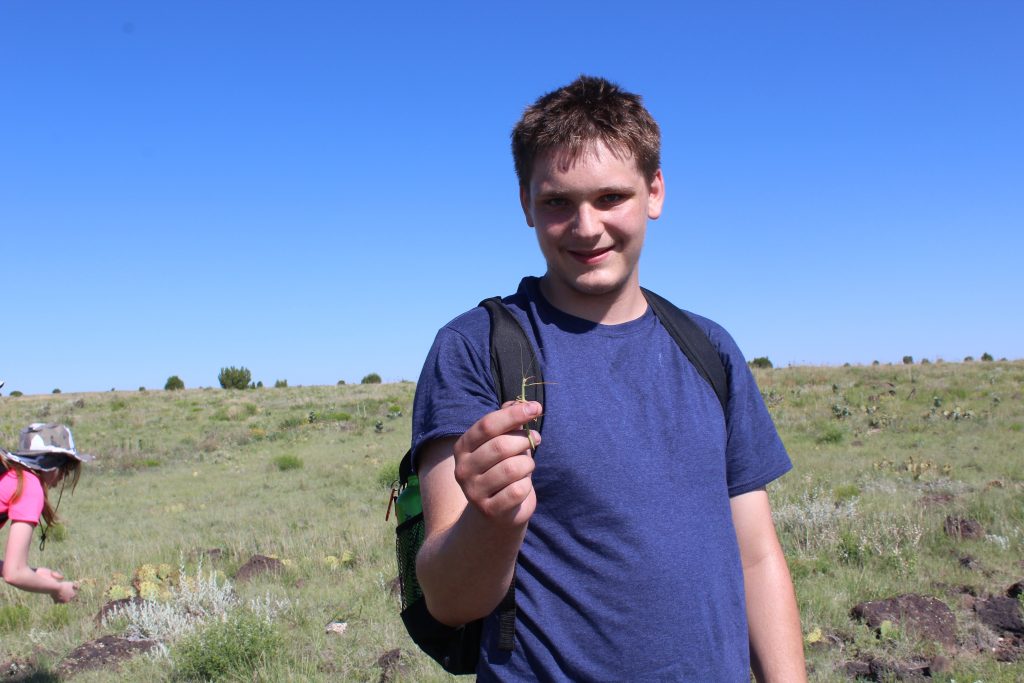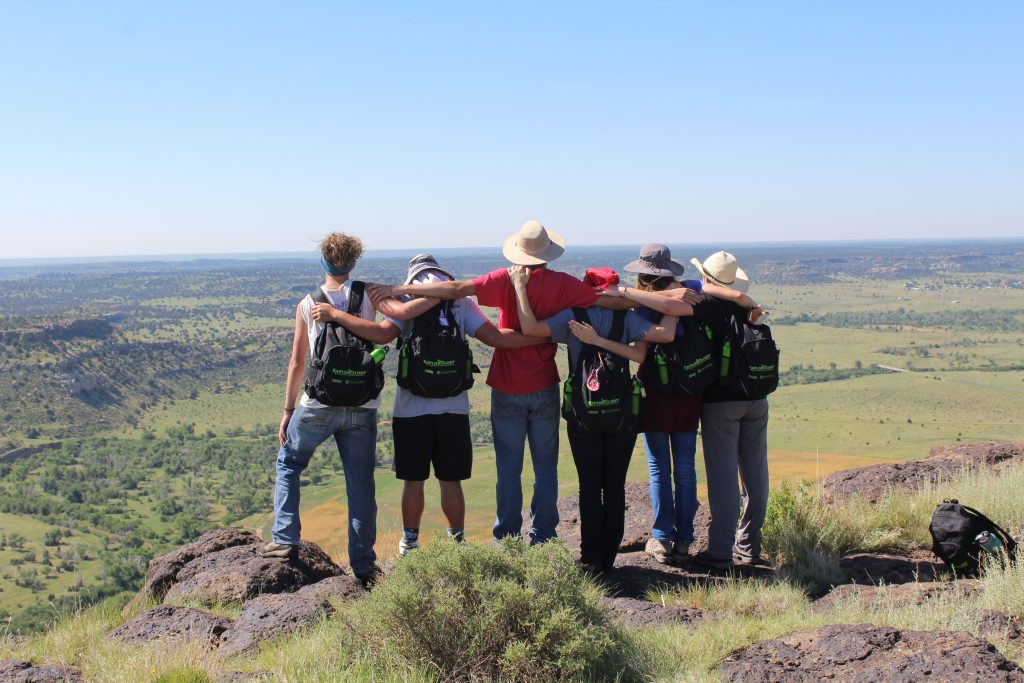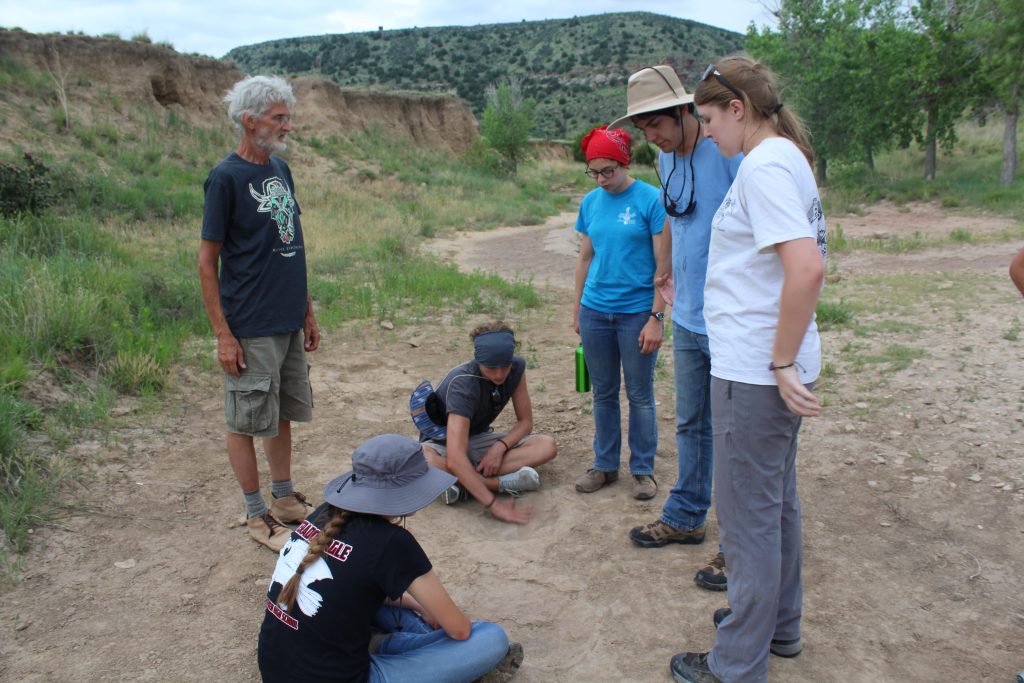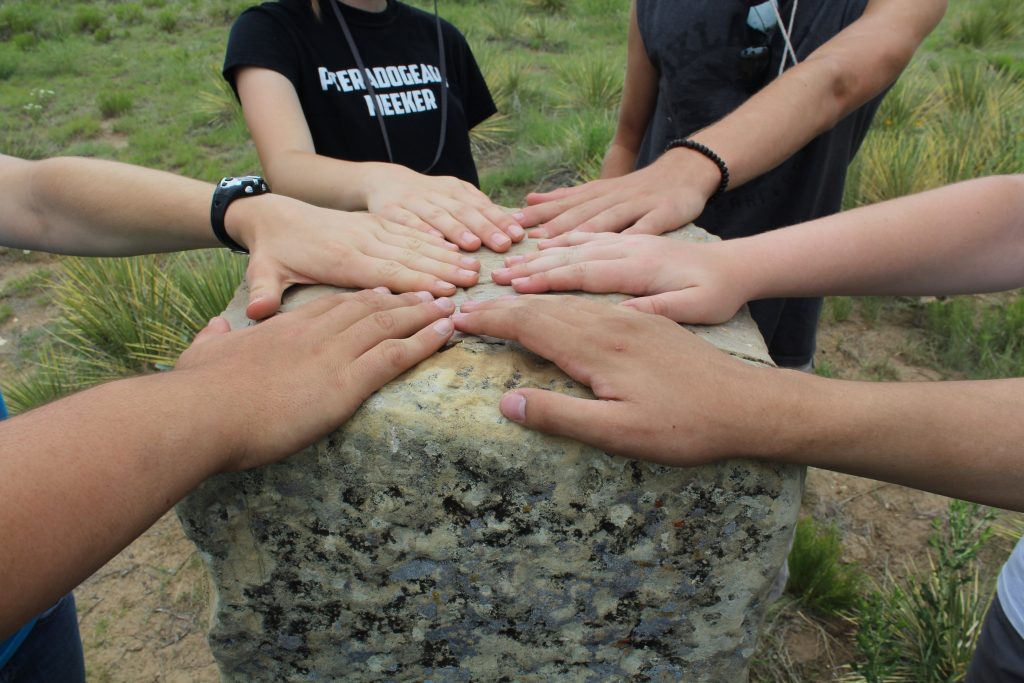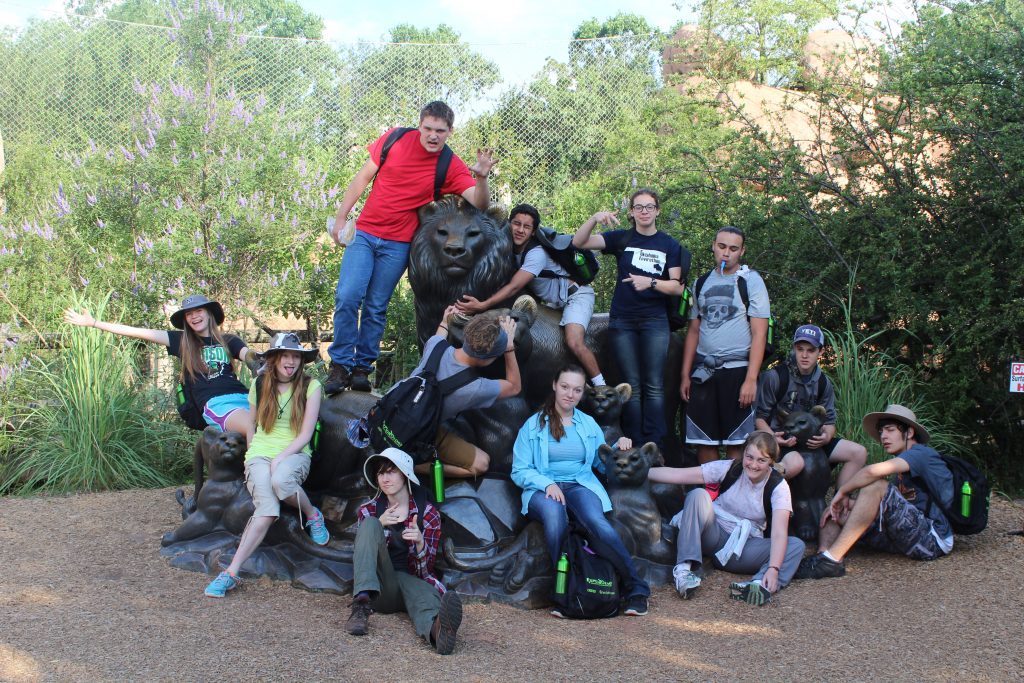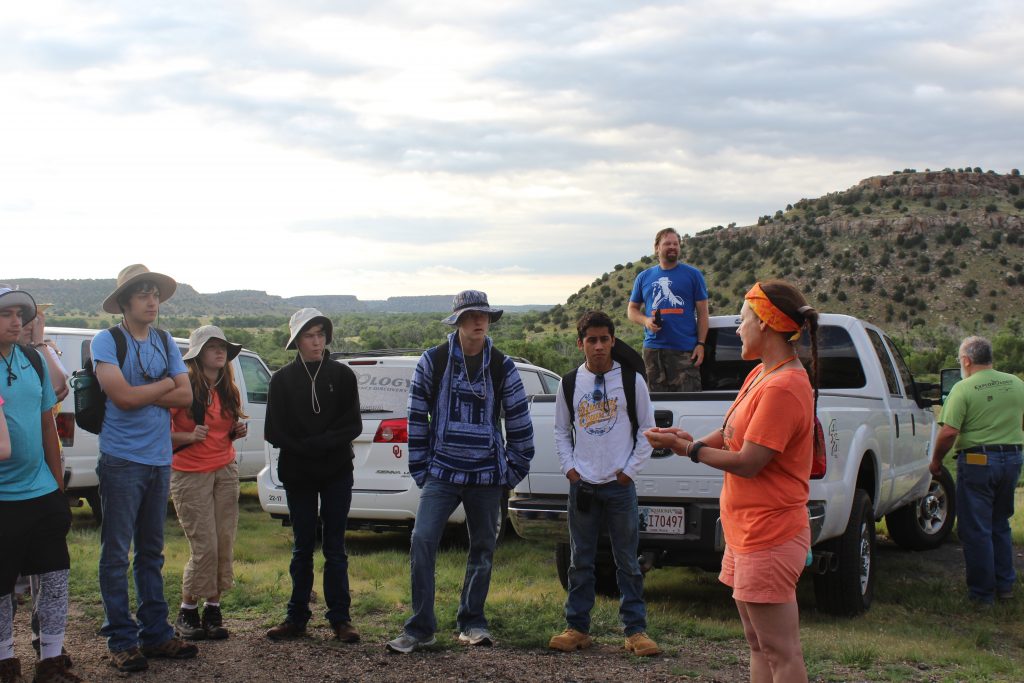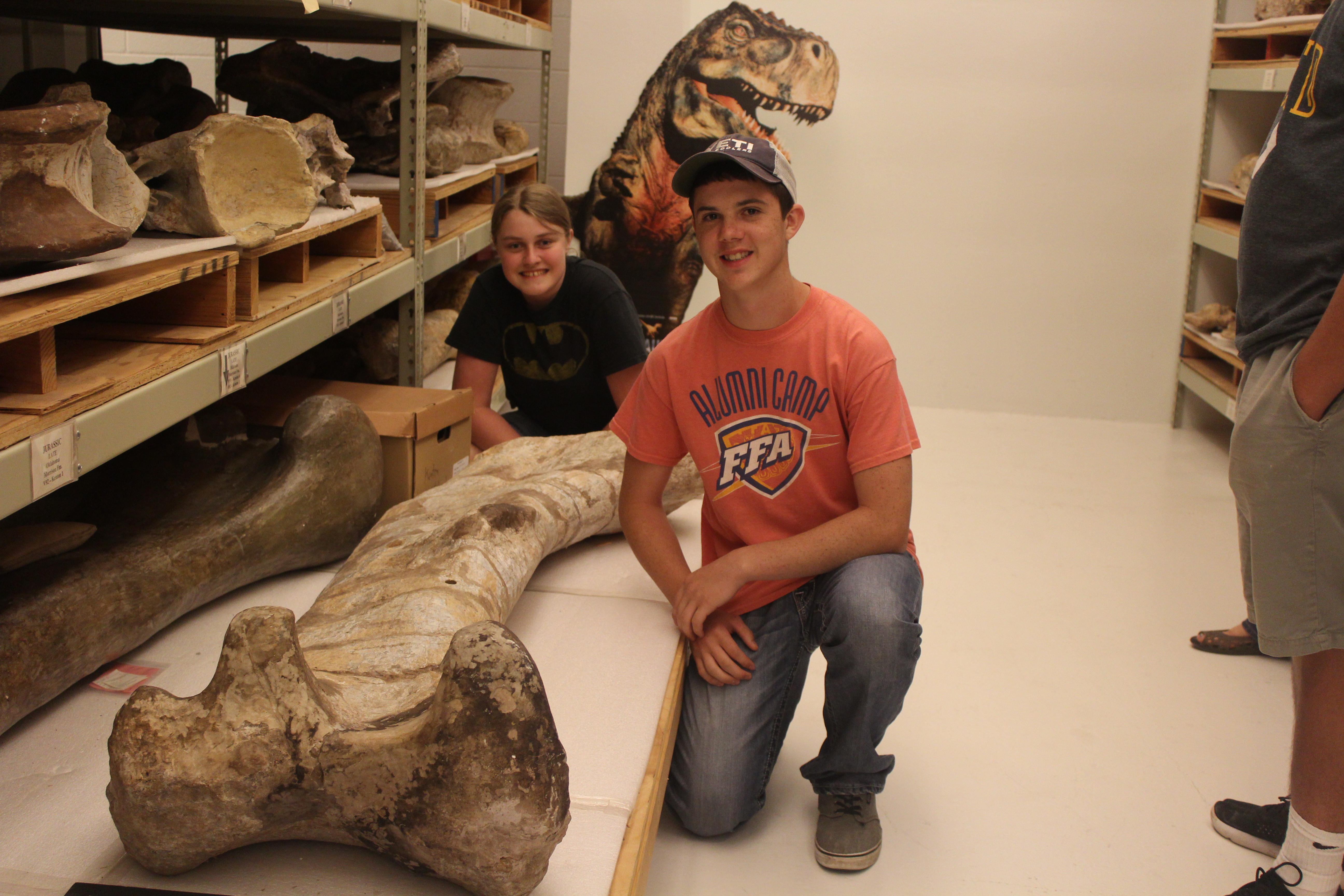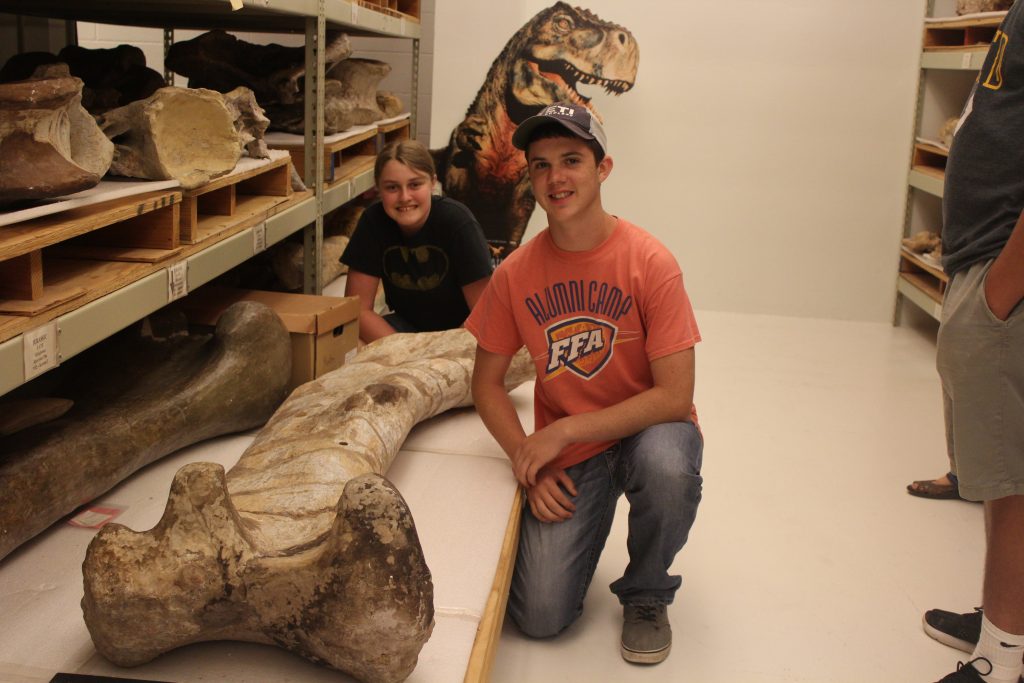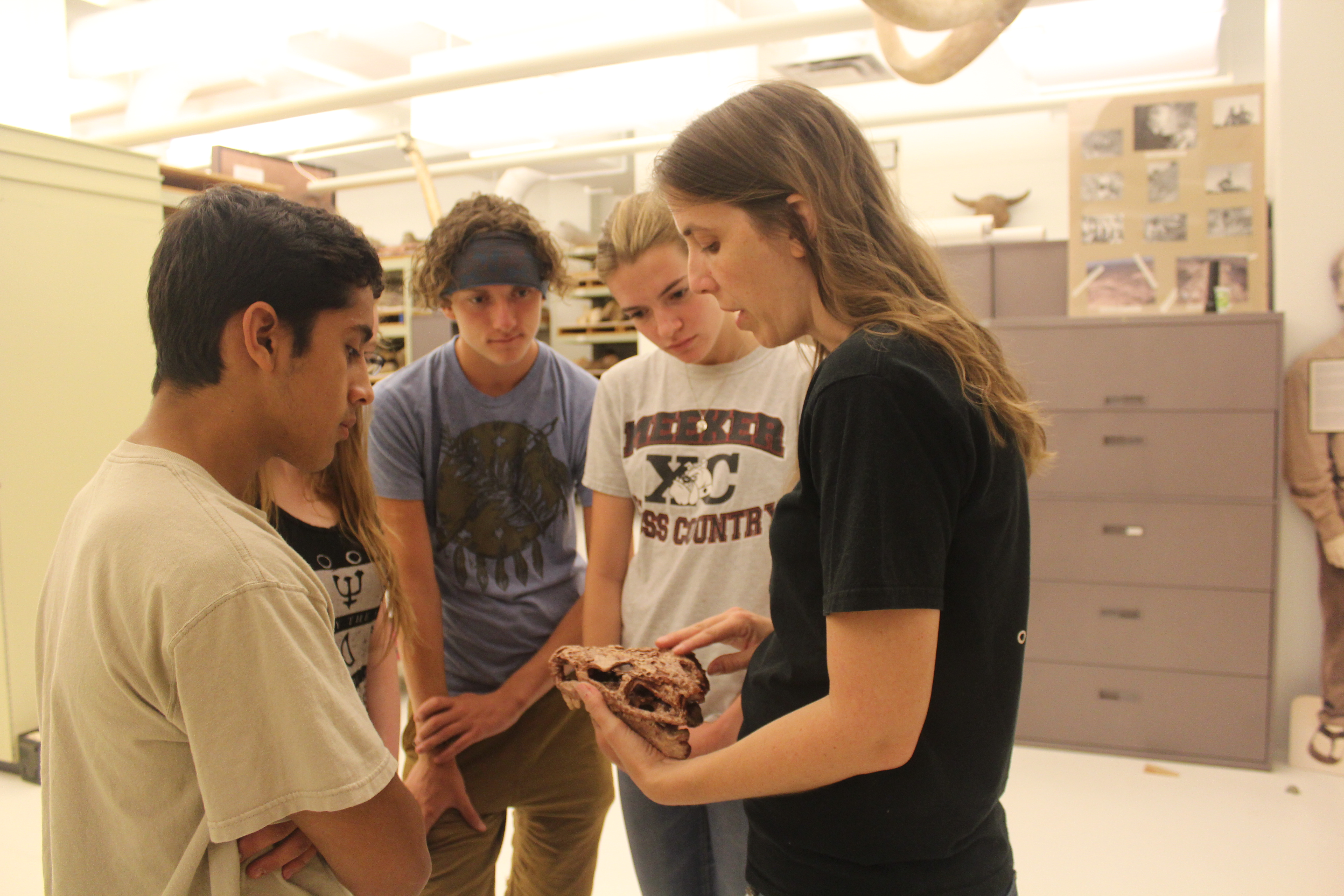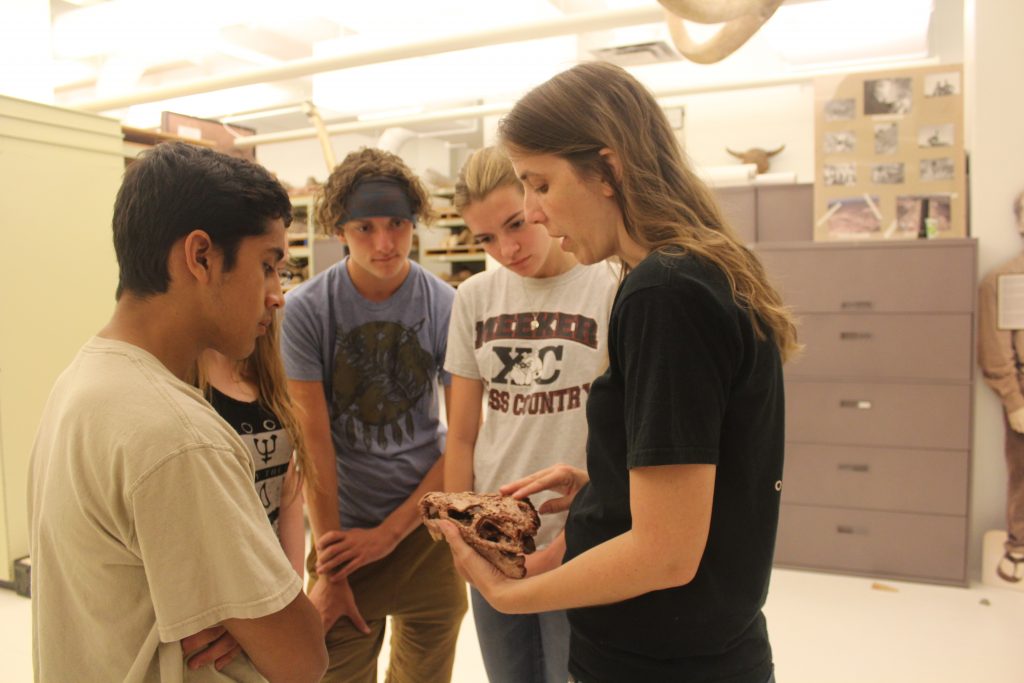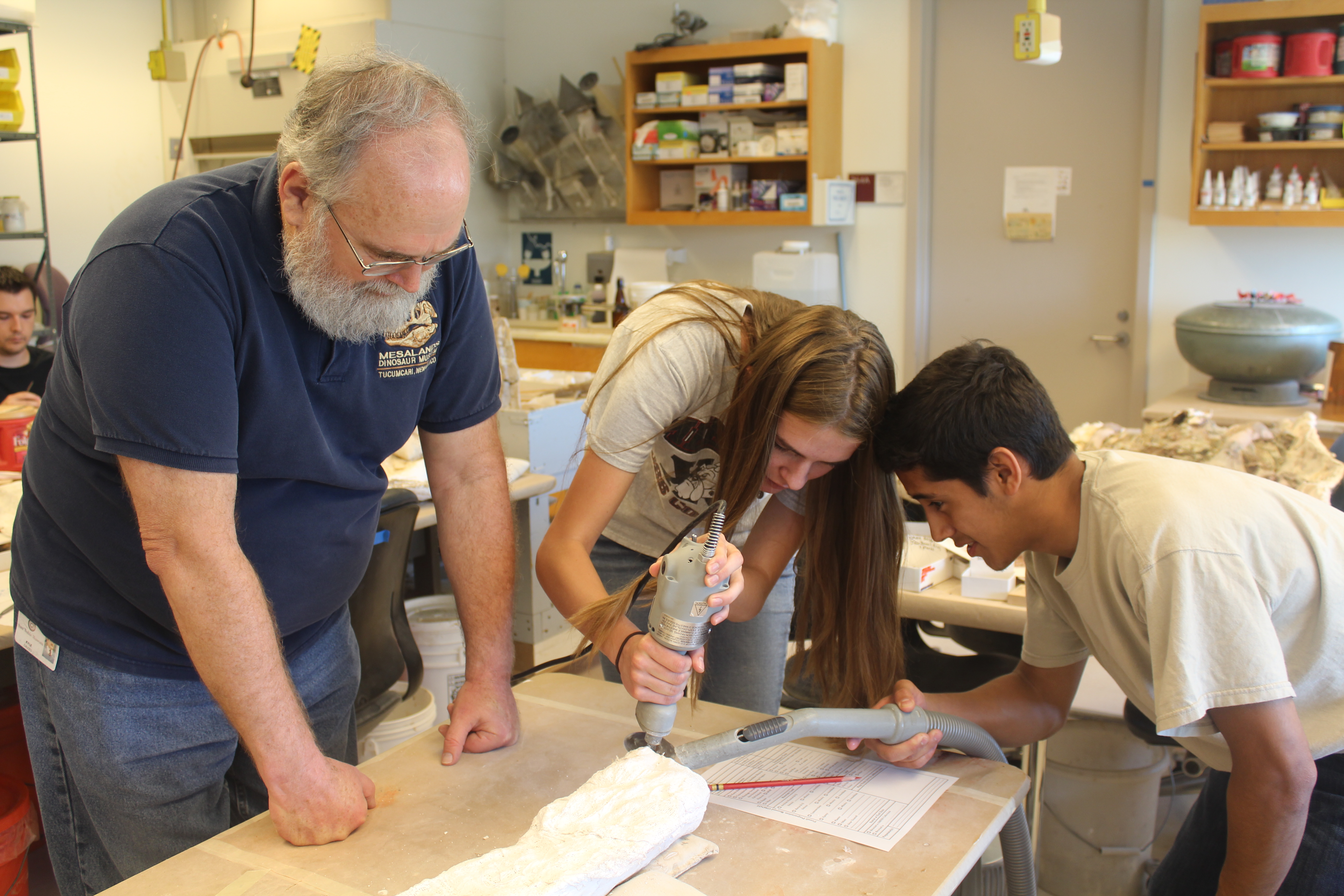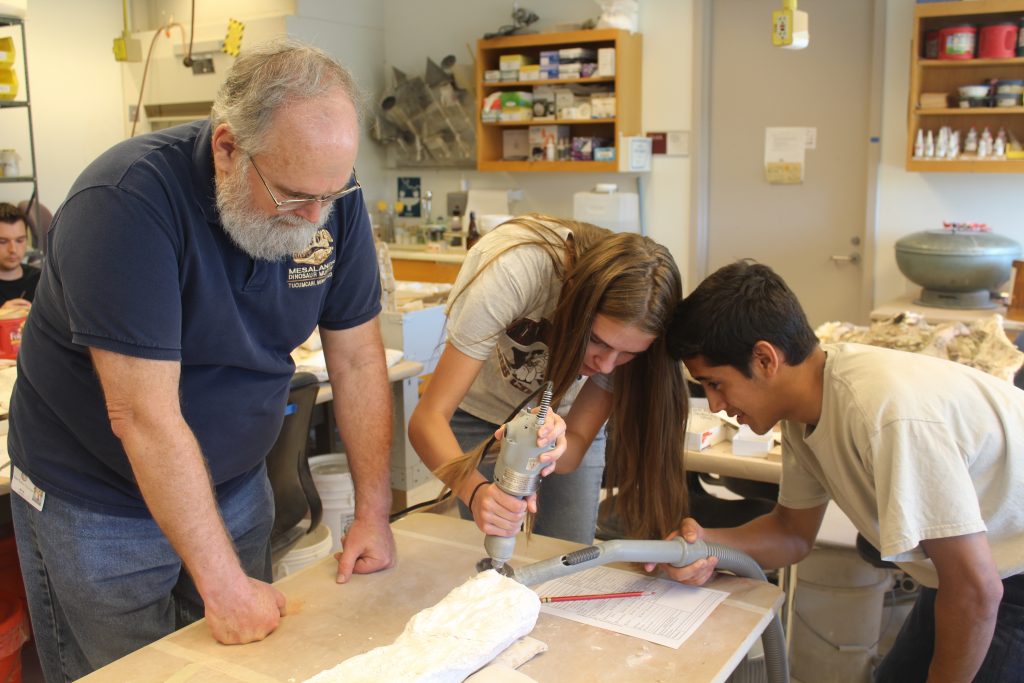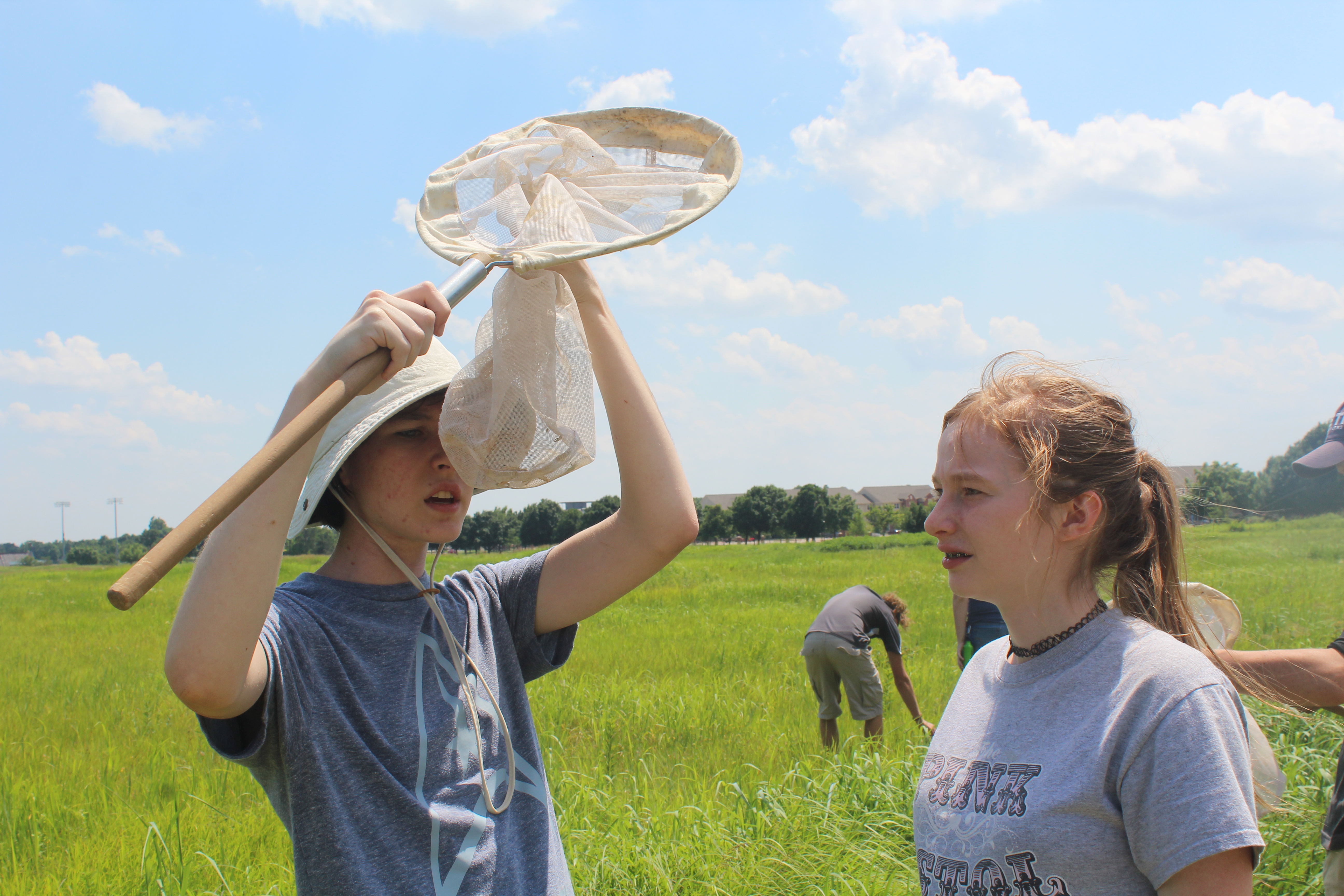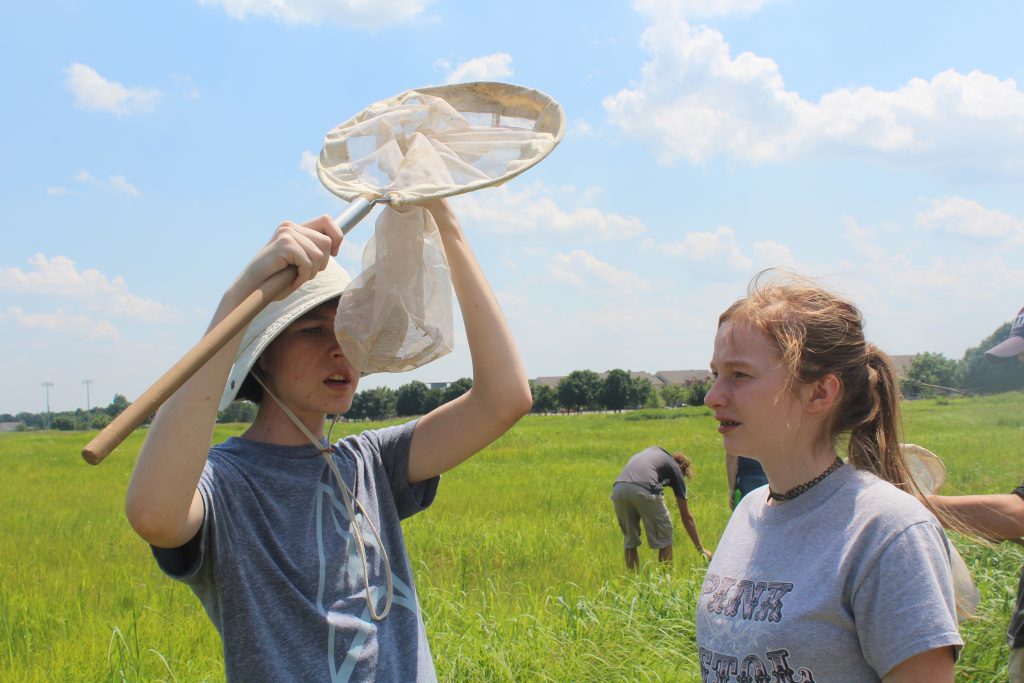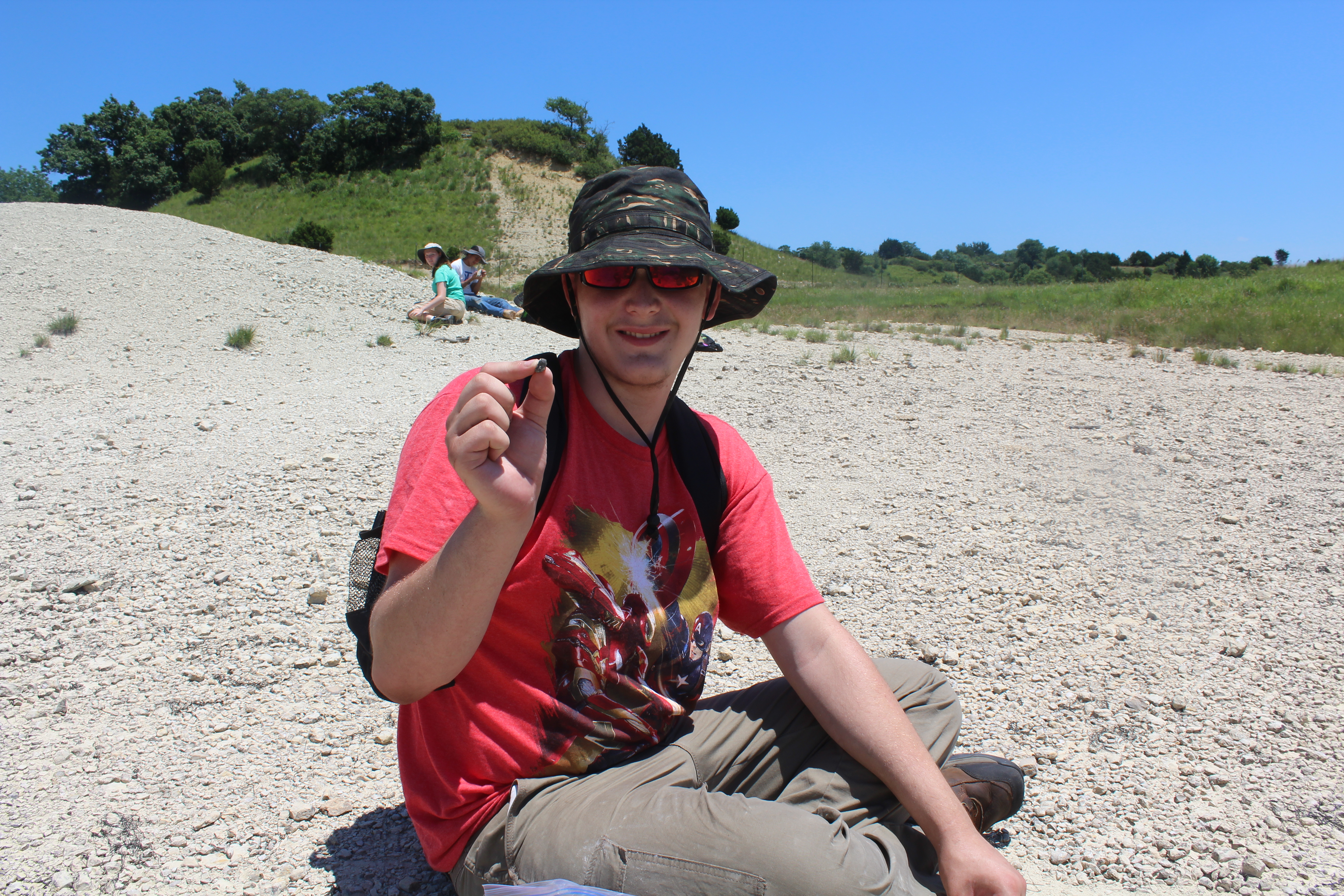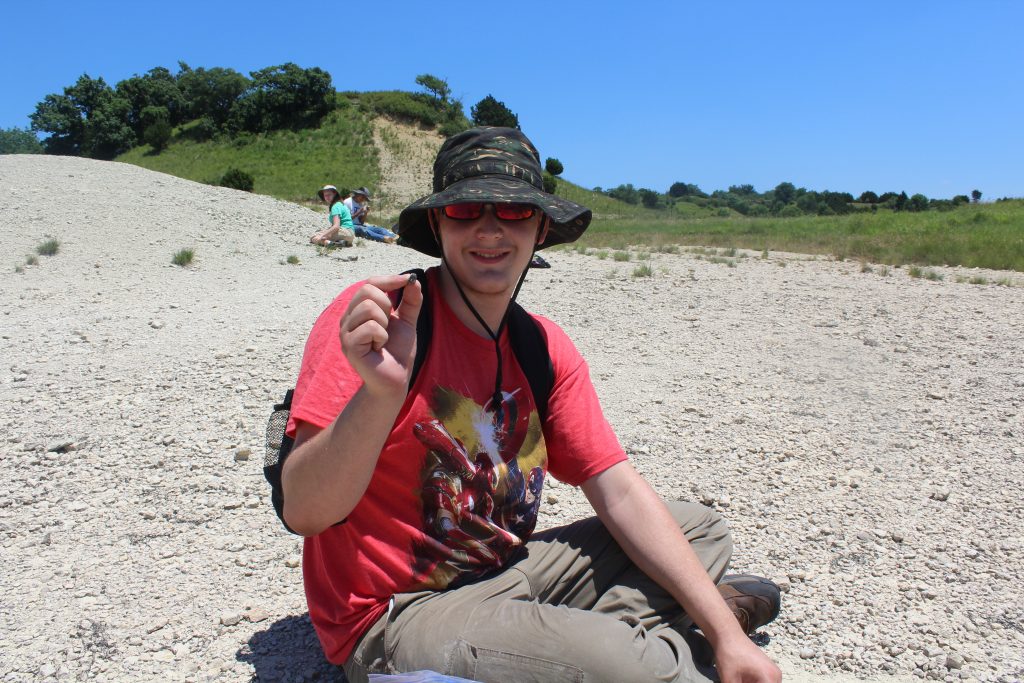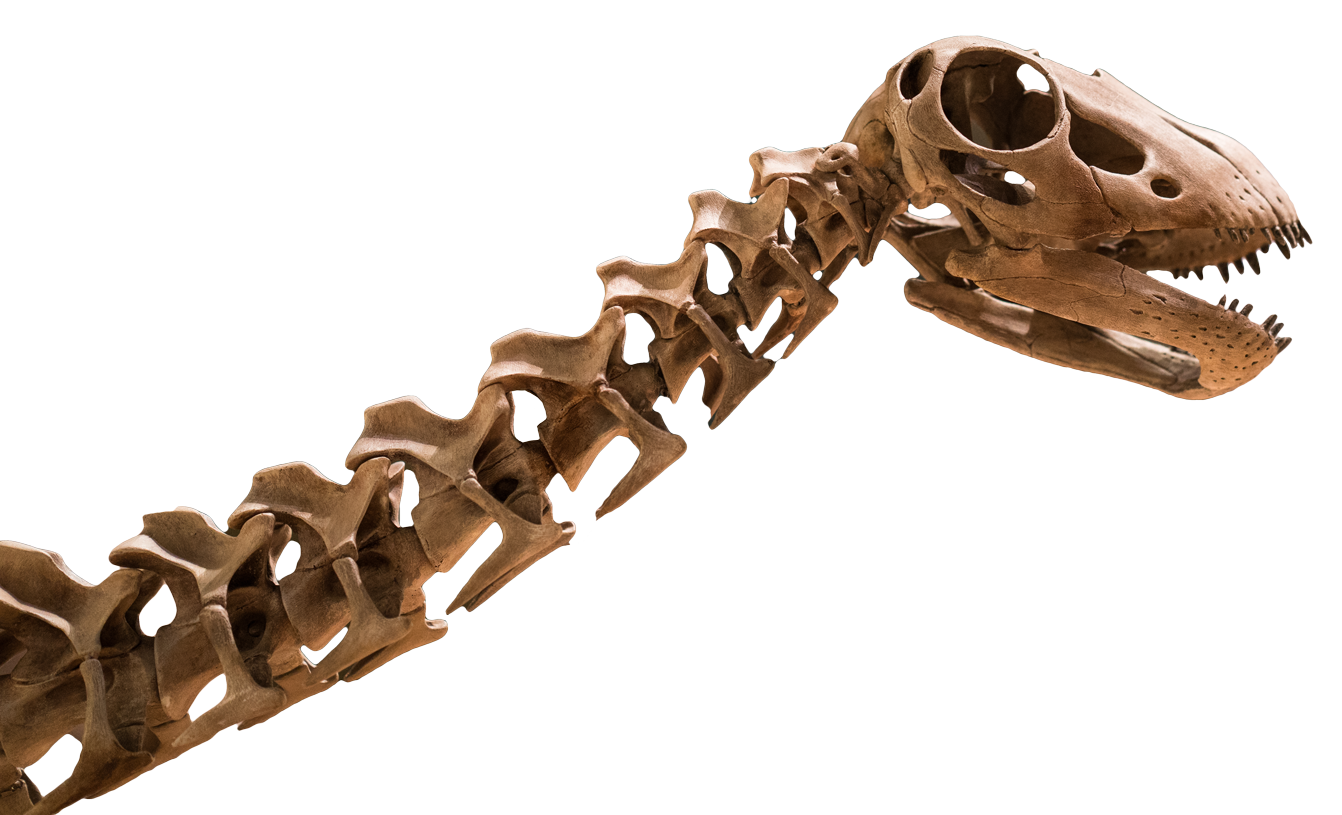Check out pictures from our 2016 adventure!
Paleo Expedition 2016 Blog
June 5
On this first day of Paleo Expedition, participants have met new people and stepped into their science experience with activities and a visit from Dr. Nick Czaplewski, one of the curators of Vertebrate Paleontology. Ending their first day, students are asked: What are you most looking forward to during the Paleo Expedition program?
Adriana B.: I am most looking forward to going to Black Mesa and assisting the scientists there. It would be really cool to find a dinosaur! 🙂
Keely L.: I’m most excited about the trips and experiences I get to have with the new people I met today, this is going to be awesome!
Dana W.: I look forward to learning about osteology at the zoo and getting hands on experience and learning about what it takes to do this and what we need to study.
Addie R.: More than anything I am looking forward to learning all I can. Specifically I am excited to get to the vertebrate dig site. I honestly don’t even have the words to describe how excited I am to touch real fossils in the ground with my own hands and be a part of this incredible science. And also being real dinosaurs are the best.
Elaina E.: I am looking forward to getting a hands on experience with Paleo Expedition.
Madeleine O.: What I am looking forward to the most during the Paleo Expedition are the friendships I will make and the hands on experience in the field.
Matthew S.: I’m most excited about finding and characterizing the fossil types at our digs, and also working with professionals at an active dig sites.
Tyler H.: I look forward to learning new things, meeting new people, and experiencing new experiences. Its going to be an amazing adventure!
Townsend N.: I am most looking forward to digging up actual dinosaurs again, and hopefully I will find something new. I look forward to seeing how things have changed since last year, and what the changes hold in store for me.
Ian M.: I am looking forward to going up to Black Mesa and with luck find a dinosaur fossil. Also, I can not wait to sleep with the dinosaurs on June 10. This whole trip will be awesome!
Matthew James S.: this experience so far has been amazing and i cannot wait for what the next two weeks holds for me as an artist, paleo student, and an elk city big elk!!! ps-these people are amazing
Jeffri J.: Today I met Dr. Nick Czaplewski who provided some wonderful incite on what it means to be a scientist, which was to me as a young student aspiring to someday become something equal to what he is, for me what i am most looking forward to is working out in the field with him and picking his brain some more.
June 7
Before we head out to the field today, we asked our participants: what qualities, characteristics or skills do you think someone needs to be a paleontologist?
Tyler H.: A paleontologist needs the ability to make observations. Paleontology requires patience, and a positive attitude as well.
Dana W.: I think that the skills a paleontologist needs is to be observing, able to work well with others, know what to do, and organized.
Matthew S.: I think a characteristic that is needed to be a paleontologist is that you need to be adventurous and willing to try new things.
Addie R.: I feel the best qualities that a Paleontologist can have include a keen observational sense, a meticulous attention to detail, patience when coming up empty, and an incurable sense of curiosity.
Ian M.: You need patience and determination so that even if you don not find a bone that one day, you can find one another time. There is always tomorrow.
Jeffri J.: For me the qualities and characteristics to be a good paleontologist is to be able to work well in a team and able to observe and find the problem and the solution to that problem when you find your self stuck.
Adriana B.: A paleontologist needs to be patient, observant, optimistic, and not afraid to try new ideas.
Townsend N.: A paleontologist needs to be devoted, and they need to be aware and vigilant of their surroundings. A paleontologist needs to know that there wont always be a big reward, but that every find is a reward, and that everything is valuable in some way. A paleontologist definitely requires diligence at the site, they may not find what they want immediately.
Matthew James S.: The skills you need to be a paleontologist in my opinion is to be well educated and to love what you are doing. Yesterday A paleo botany scientist came and talked to us and took us to the museums collection of fossilized plants and I found that to be amazing. P.S The trust falls here are nerve racking….
Madeleine O.: Qualities a paleontologist need to exhibit are the ability to work well and communicate with others, have a broad knowledge of their field, and to have an open mind to new ideas.
Keely L.: A paleontologist definitely needs to be able to observe from many different perspectives, they need patience so they don’t rush conclusions, they need to stay positive in all situations, and boundless curiosity and passion for what they do.
Elaina E.: i believe in order to be a paleontologist you need to be curious, observant, and passionate these skills are not only useful in paleontology they are also useful in life
June 9
We are back from several days of exploring the ancient and modern environments of Oklahoma! After hiking through the ancient Wichita Mountains, we got the chance to explore the ecology of the area with Dr. Nick Czaplewski, who also helped up brush up our survival skills! Then we traveled to a 400 million year old invertebrate fossil site in Sulphur, where we researched the various fossils that we found. After returning to the museum to meet Dr. Katrina Menard, our curator of Recent Invertebrates, we are all ready to see how data collected in the field can be stored in the museum! After a busy three days, we asked our participants: what was your favorite part of our recent adventures?
Tyler H.: I personally enjoyed hiking in the Wichita mountains. The view from the top of Mount Scott was absolutely breathtaking. I also enjoyed learning how and attempting to make fire using the bow-drill method.
Elaina E.: my favorite part of the recent expedition was working at the invertebrate fossil site. I enjoyed this because during this activity I experienced hands on scientific research that I have been looking forward to
Ian M.: There are so many great things that we saw, did, or experienced in these past few days. Going to the fossil site of White Mound is the best one so far. I found many amazing specimens like a snail shell, worm burrow, and what I think is the first prehistoric vertebrate at this site. There are still many other exciting new adventures to be done yet this so far was the best one. Who knows what great things we will do next?
Jeffri J.: Being actually find fossils at an actual site and at the same time conducting our own experiment to answer a question we had about the site, made me feel like I was a real scientist in the field making it my favorite part of our adventure.
Dana W.: My favorite part about these last few days had been going out to the fossil site in Sulphur and researching and learning about these fossils.
Adriana B.: My favorite part of our recent trip was boulder hopping at Mount Scott. I had never been to the Wichitas before, and it was really fun to explore the area and try new things with my fellow Paleo Expeditioners. The view was amazing! 🙂
Keely L.: My favorite part of the past few days would have to be sitting together at camp. After a long day we sing songs, play games, and make each other laugh until we can barely breath!
Matthew S.: My favorite part about this trip so far has been the view we had at the top of Mount Scott and being able to see miles into the distance.
Madeleine O.: My favorite part about our recent adventure was fossil hunting at White Mound. I did not know that fossil could be out in the open and that easy to collect. The best part about fossil hunting was finding a Trilobite! It was amazing to share this experience with everyone!!
Matthew James S.: My favorite part of this adventure has been finding my trilobite at the white mounds but also the car rides and fire building skills have been fun too. The other thing I have found is I would love to have a fossil or bug named after me (noodle) I think that would be awesome! P.S. Golden corral tonight is gonna be extravagant (shell city)
Addie R.: Where do i even start? First off Nick was an absolute legend, it was an honor to have the opportunity to learn from him. The weather on Mt. Scott was delightful, and despite less than favorable bathroom conditions, the camping was a blast too (I actually managed to pitch a tent). Overall like most of us though i’d say that White Mound was by far the most memorable and exciting experience, even if i did lose my perfect brachiopod fossil (it was the smallest one too, which is probably why i lost it haha). My favorite part though? Definitely the group. The people I’ve had the honor of spending these past five days with has been more than amazing, already i feel like i’ve known everyone my whole life! With so many inside jokes, nicknames, conversations (both on and off topic) and of course Shell City, i can only imagine how close we will be after 15 days together! Looking forward to more adventures.
Townsend N.: Its super difficult to decide on a favorite thing we’ve done in the past few days, its all so awesome!. I’ve enjoyed getting to talk to Nick and he has shown us so many interesting survival tips and tricks in the Wichita mountains. Our trip to White Mound was also amazing, as ever. There was still an innumerable amount of fossils to see at the site and it was a blast. Back at the museum when we got to see all the fascinating insects and arachnids was also a highlight. Katrina is a wealth of knowledge when it comes to all sorts of insects. I’m looking forward to the next few days!
June 10
We’re almost one week into Paleo Expedition; time flies when you’re learning about the ancient past! Today we got the amazing chance to work in the Vertebrate Paleontology collection and lab. In the collection, we learned how to organize, label, and catalog specimens for future research. We then got to practice the same techniques that paleontologists use to collect and preserve fossils in the vertebrate paleontology lab. We’re all excited to put everything we learned today to use once we head out to Black Mesa next week!
June 11
Today we got to visit the Museum of Osteology and the Oklahoma City Zoo to see some amazing skeletons and animals. Dr. Nick came along to help us discover how we can learn about ancient animals by comparing them to animals alive today. We even got to go behind-the-scenes at the zoo, to see how large land animals (like rhinos!) are adapted to their environments. Who knows; maybe we will be able to discover a large ancient land animal next week!
June 12
Today’s the day: we’re off to Black Mesa! With limited internet access out in the field, we’ll post updates as often as possible but won’t be able to share photos or participant comments until we return. Here’s to a great week of friends, digging, and science!
June 14
After two days in Black Mesa, we’ve all agreed that the long drive here was worth it! On our first day we got to meet Dr. Anne Weil from OSU, as well as Kyle and Jen from the Vertebrate Paleontology collection, who showed us the proper techniques and precautions to use when working in the quarry. We also went on a “tour through time” with Dr. Nick Czaplewski, learning about the geologic history of the Morrison Formation. We even got to follow in the footsteps of dinosaurs when we stopped at a dinosaur trackway site! Dr. Katrina Menard is here as well, helping us develop research projects to study the ecology of the Mesa. While it may be hot and dry here, the things we are learning, seeing, and doing are more than making up for it.
June 17
After an almost 400 mile drive, we are finally back to Norman! The past few days at Black Mesa were amazing. We worked hard with Dr. Anne Weil and her team, who not only showed us how to excavate fossils at the quarry, but even took us prospecting for future excavation sites! Nick and Katrina continued to see how modern ecosystems can teach us about the past; we hiked up Black Mesa to study the differing ecology, and even conducted experiments to study ant nutrition and behavior. What an amazing trip! After a week of life out in the field, we asked our participants: what was your favorite thing about your time at Black Mesa?
Townsend N.: There wasn’t a single thing I did not enjoy during my time at the Black Mesa. One thing I enjoyed in particular was continuing our dig at the quarry. I loved to see how the quarry has changed since my time there last year. We got to flip another fossil, excavate more small fossils, use rock hammers and chisels to dig through rough sandstone, and many more new things. It was even more enjoyable excavating this year, than last year!
Matthew S.: My favorite part about are trip to Black Mesa was spending time at the bed and breakfast with the animals there. It was nice after working at the quarry digging and doing animal behavior research with Katrina to go relax and become surrounded by animals. My personal favorite was Sissy the Siamese cat.
Dana W.: My favorite part about my time in Black Mesa is experiencing the work of paleontology in the quarry. It taught me a lot about the work that paleontologists do and how they work hard to dig out fossils to teach and show us what the past was like and what animals were there.
Tyler H.: My favorite part is the hike to the top of the mesa itself! The view is stunning. It helps remind us of how small we really are. It’s very fascinating to understand how the mesa formed. It’s also intriguing to study the way the plants and insects differ on top from that at the bottom of the mesa. On a close second, I also enjoy excavating fossils in the quarry. It requires you to pay close attention, and be very patient.
Jeffri J.: Meeting such versed people filled with so much knowledge to answer every question we had with an interesting answer made it my favorite part out of the time we spent at the Black Mesa.
Ian M.: Of all my adventures, digging in the quarry was what I was meant to do. Not the Sun beating down on my back or the dirt against my skin broke my spirit. Hard work with wooden tools trying to get a block of rock with bones in it rewarded me with using metal tools to dig a trench to get an Apatosaurus neck bone. From tiny vertebrae to turtle shells, the things I found gave me the gift to be patient and observant so that I could see even the tiniest bone in the rock. One day, I will return and I will be hungry for more.
Elaina E.: My favorite part of our trip to Black Mesa was climbing to the top of Black Mesa. The view was beautiful and it was incredible to be surrounded by nature. This climb taught me that putting in hard work can cause a good outcome.
Adriana B.: My favorite experience from the time at Black Mesa was when I got to finish and prep a fossil for jacketing. Once we realized that we could finish excavating the fossil and jacket it in an afternoon, Keely, Madeleine, and I were determined to complete the task. We worked hard, and after lots of digging, we were able to jacket the fossil. After jacketing, we then flipped the fossil, and all of the people that we worked with were there cheering us on. It was an amazing feeling when we finished, and it is something I will never forget.
Madeleine O.: My favorite part about the trip to Black Mesa was hiking the mesa with Katrina and Nick and learning how present day science ties into paleontology. The hike was tough but it worth it once I saw the beautiful view. The time I spent with Katrina and Nick fun because we learned about how the different sciences tied together while visiting places that correlated with the lesson.
Matthew James S.: My favorite part of the Black Mesa experience has been being able to work with the real scientist in their field of study [paleontology]. Also our long talks with our mentors about life,science,headbands,red lobster and dreads! Also overcoming some things on this trip like washing dishes with food all over them and going almost all week without washing my hair [for dreads]. Other than that the sing-alongs in the car the fun games and the gorilla under the tree, this is something I will look back on and remember my whole life and making all these friends along the way is amazing. I love these people!
Addie R.: Wow. Where do I even begin? For me it was the challenges, every day was something new and amazing, there was so much to learn and do, so many opportunities to push myself to my limits and break through them. Before this week I never would have believed I could have climbed up a Mesa and a Butte in one day, but even though the circumstances that led to such an opportunity were… unfortunate (WARNING: Sloppy Joe’s and Merry-go-rounds do NOT mix well), I did it; I grew stronger and braver in myself and that’s worth ALOT. But my favorite part? I had the opportunity to help Lindsey put cases and labels on a bunch of very small, fragmented pieces of vertebral processes and other bones belonging to Dinosaurs, and just knowing that those precious pieces of such amazing creatures, glinting in the sunlight for the first time in millions of years, passed through my own hands, knowing I will forever be a part of that past and the future science that comes from those bones. THAT, to me, is the most special thing of all. This week I climbed mountains, made discoveries (and friends with a walking-stick), fell off the Merry-go-round and forever became a part, no matter how small, of the past and the future of this incredible science.
Keely L.: My favorite part of being out at the Black Mesa Homestead site was a multitude of experiences. I loved learning about paleontology, prospecting, and digging in the quarry. I loved getting to help jacket and flip one of the fossil groups, and work with the scientists out at the mesa. Camping was fun, but I was relieved to be at the bed & breakfast so I could take a shower for the first time in 6 days. We played Grog in the dark and got scared by a “gorilla” under the tree! Learning about archaeology and entomology with Nick and Katrina was a blast! I love all the people I’ve met on this trip and all the inside jokes we made were hilarious(at least to us)! Black Mesa was an experience was one I definitely will never forget.
June 18
After an amazing 15 days of science, adventure, and friendship, we are ready to go back home and share all that we have learned with our friends and families. Before Paleo Expedition ends tomorrow, we asked our participants: how has Paleo Expedition changed your view about paleontology or science?
Tyler H.: After this program, I realize that science is everywhere. Science is everything! From the air we breathe to the way we move, it’s science. From the simplest thing you can think of to the most complex machinery that mankind has created, there’s a science to it or behind it.
Elaina E.: Paleo Expedition has changed my view in science by allowing me to see behind the scenes on having a profession in science. Through this I have learned the hard work, dedication, and passion that goes into having a career in science.
Townsend N.: Paleontology for me has always been important and interesting to me. Paleo Expedition always manages to show me a new facet of Paleontology and revitalizes my interests in the subject. We got to do new things this year and I learned many new things from this trip.
Madeleine O.: The Paleo Expedtion has change my view on the overall field. I learned that paleontology is more than working in the field but also working in the lab. The science takes time and patience and I appreciate all the work the scientist do. I thank everyone who has made the is experience memorable and the friends I have made!
Dana W.: Paleo expedition has changed my view of paleontology by showing me how much teamwork it takes to uncover, prepare, and show fossils and it was way more meticulous than I thought.
Keely L.: This camp has changed my view significantly. I learned it’s a lot more than digging up old bones, you have to be attentive, creative, and passionate. You have to know what types of rock will most likely have fossils, you need to be able to be careful and still chip away at rock. In the lab you have to know what you’re looking for and be able to make comparisons to modern animals to guess how they lived back then. It takes a lot to be a paleontologist, but I think that fact has made me even more interested!
Ian M.: These past 15 days have been the best one I ever experienced. I have wanted to dig for bones ever since I was four and this adventure has given me days and lives of a true paleontologist. I now know what I will be able to do and I am not disappointed. I also get to see the university I will attend so that I can begin my future journey.
Matthew James S.: This camp has changed my view on everything completely! Coming to this camp was the best thing i have ever done!
Matthew S.: This trip has changed my outlook on paleontology its not your Jurassic Park brush the dirt and find a fully preserved raptor its hard work that takes a true love for paleontology to be able to do what the scientist I’ve met in the last few weeks do everyday.
Adriana B.: Paleo Expedition did not change my view on paleontology, instead it gave me a view on the subject. Before this trip, I had no knowledge of paleontology, so this trip taught me all about the subject. I learned what it takes to be a paleontologist, and all of the work that goes into it. I also have a new respect for the subject, and my interest in it has increased immensely since the beginning of this experience.
Addie R.: This experience has been life changing. I’m so glad I had the chance to have this amazing experience and I hope I’m lucky enough to have it again. Thank you to everyone who made this possible, this has been the most exciting and amazing week of my life.
Jeffri J.: I had many preconceptions about Paleo Expedtion, such as awesome, fun, educational and so on. However I never thought of it as I do now at the end of my time at Paleo Expedtion. I did not how extensive of a field it could be, with invertebrate, vertebrate, botany ecology, geology, etc. all tied with in paleontology. In short it, the overflow of information that I learned during Paleo Expedtion completely blew my mind!


